Conheça o viajante inglês que quer comprar uma casa no Ibiti
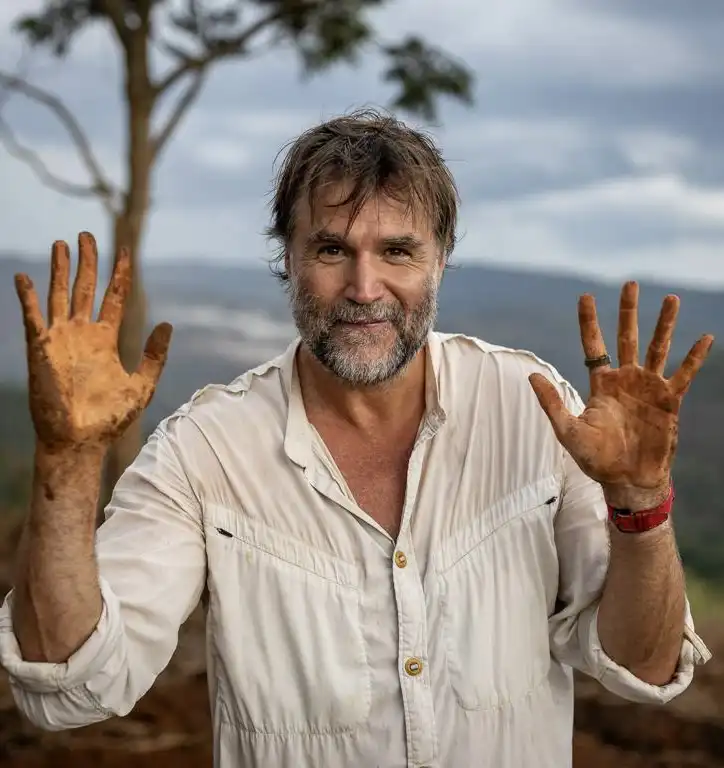
Henry Cookson já acampou com um grupo de turistas dentro de um vulcão nas Ilhas Galápagos, rodeado de tartarugas gigantes pré-históricas. Já caminhou até o Polo da Inacessibilidade da Antártica, onde, a 90 graus abaixo de zero, encarou face a face o lendário busto de Lênin. Cortou a Groenlândia de Sul a Norte em pranchas de snowkite. Levou o Príncipe Harry e um grupo de veteranos de guerra ao Polo Norte geográfico na expedição “Walking with the Wounded”. Foi pioneiro a levar turistas em um superiate e em submarinos à Antártica. Levou gente a escalar as alturas do Kilimanjaro e do Aconcágua. Mas foi na Serra do Ibitipoca que o viajante inglês decidiu construir sua primeira casa do zero. “Eu não fazia ideia da magia que nos esperava”, admite o explorador britânico, fundador da Cookson Adventures, empresa especializada em turismo em áreas remotas ou de condições extremas. Ele conheceu o Ibiti em julho de 2023, quando esteve no Rio de Janeiro para um casamento. “Eu nem era convidado, um amigo que me chamou para vir, e eu disse ‘por que não?’. Não podia imaginar a mudança que aquilo causaria na minha vida.” Os amigos de Cookson haviam programado uma estadia de duas noites em um “lugar no campo”. E esse lugar era o Ibiti. “Em questão de horas eu já me sentia em casa. Algo ali me fez querer pertencer àquele lugar.” Embora tenha estado em localidades vistas de perto por poucos olhos humanos, de ter excursionado pelas mais paradisíacas e desafiadoras paisagens da Terra, Henry Cookson não havia ainda encontrado esse local de pertencimento. Há muito tempo ele procurava um lugar onde sentisse que “pertencia”, que fosse único, autêntico, dotado de natureza, senso de comunidade e integridade. Segundo Cookson, embora existam lugares no mundo “mais bonitos e com mais vida selvagem e cachoeiras maiores”, é tudo uma questão de equilíbrio. E nessa balança, pesou ainda a favor do Ibiti a existência de uma comunidade liderada pelo “visionário Renato (Machado), que reuniu pessoas apaixonadas”. Mais que um “gringo empolgado” Henry Cookson se apaixonou à primeira vista pelo Ibiti, esse “pequeno paraíso”, nas suas palavras. “Eu falei das minhas intenções com o Renato em minha primeira visita, mas ele deve ter pensado, ‘ah, é só um gringo que está empolgado’. Só que uma semana depois eu já estava no telefone com ele, que me convidou a voltar. Depois disso, em dois anos eu já vim umas oito ou nove vezes.” Em suas estadias no Ibiti, Cookson fica dez dias, duas, três semanas, mas “nunca é o suficiente”. Por isso ele decidiu construir uma casa. “O Ibiti é uma combinação de arte, da filosofia por trás de tudo isso, de natureza, de trazer a vida de volta e das pessoas maravilhosas que trabalham lá e são uma verdadeira comunidade. É um modelo de como a sociedade realmente deveria ser.” Convidado a fazer parte da família do Ibiti, o aventureiro foi encorajado a encontrar um local que parecesse certo para ele. Cookson passou muitos dias e horas explorando a paisagem, se perdendo e encontrando “becos sem saída”. Ele quer construir a casa não apenas para si, mas para receber amigos e “pessoas interessantes” do mundo todo, para que possam compartilhar a visão e a filosofia do Ibiti. Ele acredita que esse modo de vida é “essencial para o futuro de quem somos como espécie”. Cookson não tem pressa. Quer apenas ter certeza de que fará a coisa certa. “Quando descrevo o Ibiti aos amigos, digo que é a Goldilocks Zone da vida: um termo que cientistas usam para planetas encontrados no universo que são ideais para sustentar a vida. O Ibiti não é chique demais, não é hippie demais, é simplesmente o ponto perfeito em tantos aspectos: as pessoas, a arte, a natureza. Não é selvagem a ponto de ser desconfortável para se adaptar, nem remoto demais para se sentir isolado da chamada civilização, mas, ainda assim, você se sente em uma bolha protegida do caos do resto do mundo. As pessoas lá também são maravilhosas, tão gentis e prestativas, uma verdadeira comunidade de almas unidas em uma visão de como devemos tratar uns aos outros, de como devemos largar nossos celulares e nos reconectar com nós mesmos e com a natureza. Do ‘countryside’ britânico à Antárctica A ligação de Henry Cookson com a natureza nasceu na infância, em Wiltshire, na zona rural da Inglaterra. “Eu e meus amigos construíamos casas nas árvores e saltávamos sobre os arbustos”, recorda o explorador. Adolescente, viajou ao Quênia e conviveu com tribos locais e animais do Planalto de Laikipia, uma experiência que acendeu sua conexão com o mundo natural. Depois do colégio, trabalhou como guia em um safári na Reserva de Masai Mara, experiência que plantou a semente da aventura e o fez perceber que a vida podia ser muito mais do que um escritório. Mesmo assim, seguiu o caminho convencional: estudou, entrou para a Goldman Sachs e odiou cada minuto. “Depois de três anos, pedi demissão decidido a seguir meu sonho”, conta. O destino mudou em uma noite regada a uísque, quando, por impulso, se inscreveu em uma corrida de esqui até o Polo Norte magnético. Contra todas as probabilidades, venceu, e o feito o levou à Antártica, onde, em 2007, alcançou o Polo de Inacessibilidade e entrou para o Guinness Book. A partir daí, dedicou-se a explorar e guiar outros aventureiros pelo mundo. O sucesso o levou a fundar a Cookson Adventures Dívida com a Terra Muitos dos clientes de Cookson são famílias que saem em períodos sabáticos pelo mundo, como uma que navegou em um iate de 60 metros ao longo de cinco anos após vender seu negócio. “Nós sempre tentamos linkar a questão da conservação e dar um retorno através das nossas jornadas. Somos privilegiados de ter pessoas muito poderosas, ricas e influentes entre nossos clientes, e tentamos educá-las em relação à fragilidade e à importância de nutrir e cuidar do nosso planeta e dos seres humanos.” Nesse compromisso com o
Festa da Maçã celebra o plantio e o encontro no Ibiti
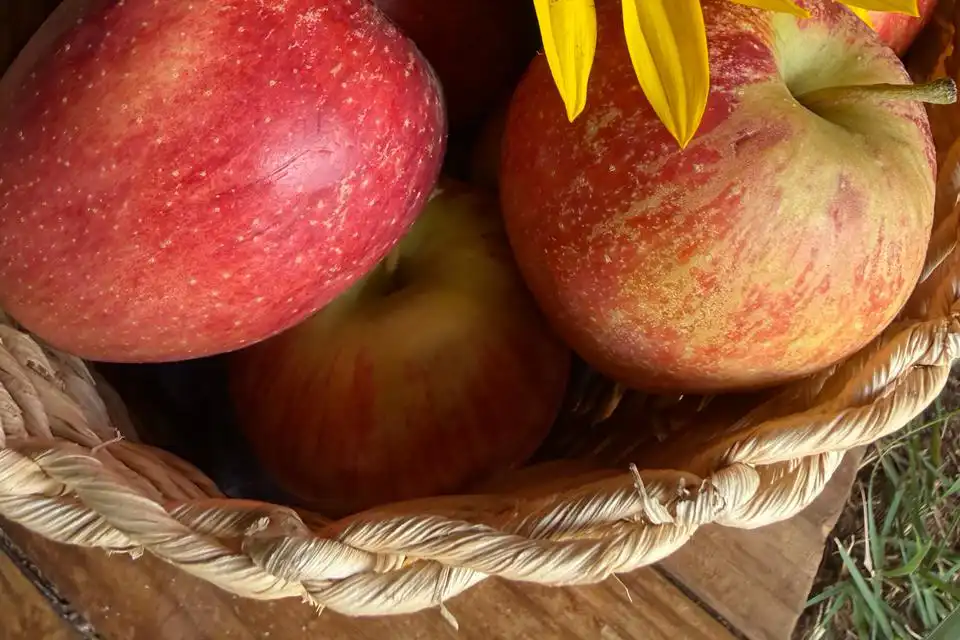
O Ibiti viveu, em 16 de janeiro, um dia inteiro dedicado a celebrar o plantio da maçã em suas terras. Para marcar esse momento, nasceu a Festa da Maçã, idealizada pela equipe do Fruity Way, empreendimento sob a coordenação do agrônomo Gabriel Barbosa, responsável pelo manejo e desenvolvimento do pomar dentro do Ibiti, entre outras atividades. “Plantamos cerca de 200 pés de maçã. A expectativa é que a primeira colheita significativa aconteça daqui a aproximadamente três anos. A ideia é trazer essa tecnologia para a região e, no futuro, compartilhá-la com outros produtores. A framboesa já se desenvolve muito bem aqui, e esperamos que a maçã siga o mesmo caminho. Queremos aliar a fruticultura ao turismo e aos produtos processados que essas frutas podem gerar, movimentando a economia local a partir desse experimento de plantio de maçãs no Ibiti Projeto”, comemora Gabriel. Com olhar técnico e sensível, o agrônomo conduz um processo que torna possível o cultivo de maçãs na serra, unindo tecnologia, cuidado com o solo e manejo orgânico. Sabor e cultura A Festa da Maçã contou com a organização da Comuniversidade e começou logo cedo. Pela manhã, maçãs foram distribuídas a todos que chegavam para trabalhar na Vila Mogol, reforçando o espírito de partilha que guiou toda a programação. Ao longo do dia, a fruta também protagonizou o cardápio do restaurante Yucca e do refeitório, com preparos como strudel, maçãs assadas e salada de maçã com aipo. Colaboradores, hóspedes e visitantes puderam saborear receitas à base da maçã, carregadas de significado. A festa aconteceu na tenda da Comuniversidade, reunindo colaboradores, hóspedes e visitantes. A abertura e o encerramento ficaram por conta da apresentação do Grupo de Danças Germânicas Schmetterling, do bairro Borboleta, em Juiz de Fora, que trouxe alegria, movimento e descontração ao evento. Criatividade na mesa Um dos pontos altos da programação foi o Concurso Gastronômico da Festa da Maçã, que contou com a participação de oito pratos concorrendo aos prêmios. A criatividade tomou conta da mesa: bolo, tortas, sorvete, drinks, chá e até coxinha de maçã mostraram a versatilidade da fruta e o talento dos participantes. Entre tantas delícias, a receita que conquistou o paladar dos jurados e levou o primeiro lugar foi a Torta de Maçã da Bá, preparada pela bióloga Maria Eduarda Branco, do Departamento de Biodiversidade do Ibiti. “Bá é minha avó materna, com quem passei grande parte da minha infância. Foi nesse convívio que surgiu a minha paixão pela cozinha. Muitas das minhas memórias envolvem nós duas preparando receitas, conversando e ouvindo rádio juntas. Quando o concurso foi anunciado, a primeira coisa que fiz foi pedir para ela a receita dessa torta, que já virou tradição na família, sempre elogiada em aniversários e comemorações. Foi uma forma de homenagear a Bá, seguindo fielmente a receita”, conta Maria Eduarda. Os pratos foram avaliados por um júri técnico composto por cinco convidados de restaurantes da região de Ibitipoca: Cristiano, do Cabra da Peste; Thays, da Casa Roça; Guilherme, do Quitutes da Beth; Taty, do Engenho Lodge; e Fábio, do Ibiti Village. Quem participou da Festa da Maçã também pôde experimentar os pratos concorrentes e saborear suco e bolo de maçã, em uma tarde marcada por cultura, troca e celebração no Ibiti. Vencedores do Concurso Gastronômico 🥇 1º lugar – Torta de Maçã da BáMaria Eduarda Branco, bióloga do Departamento de Biodiversidade 🥈 2º lugar – Cheesecake dos SentidosTerida Guanipa Munoz, venezuelana integrante da equipe do restaurante Yucca 🥉 3º lugar – Torta e Drink de MaçãLidiana Helena de Paula, integrante da equipe do Gaia Café Confira a receita premiada Torta de Maçã da Bá Por Maria Eduarda Branco Ingredientes Massa1½ xícara de farinha de trigo2 colheres (sopa) de açúcar1 ovo1 colher (sopa) de fermento em pó4 colheres (sopa) de manteiga ou margarina Creme1 lata de leite condensado1 lata de leite (use a lata do leite condensado como medida)2 colheres (sopa) de amido de milho1 gema½ caixa de creme de leite Doce de maçã6 maçãs descascadas e fatiadas10 colheres (sopa) de açúcar4 colheres (sopa) de águaSuco de ½ limão Modo de preparo MassaEm uma tigela, misture todos os ingredientes com as mãos até obter uma massa homogênea. Forre o fundo e as laterais de uma forma com fundo removível, pressionando bem. Com um garfo, faça furos em toda a massa e leve ao forno preaquecido a 180 °C até dourar levemente. Retire do forno e deixe esfriar completamente. CremeDissolva o amido de milho no leite e passe pela peneira, despejando em uma panela. Passe a gema pela peneira e adicione à mistura. Acrescente o leite condensado e leve ao fogo médio, mexendo sempre, até engrossar e desgrudar do fundo da panela. Retire do fogo, deixe amornar e, em seguida, incorpore o creme de leite. Reserve. Doce de maçãEm uma panela, coloque as maçãs, o açúcar e a água. Leve ao fogo médio até o açúcar formar uma calda e as maçãs ficarem macias. Acrescente o suco de limão, misture bem e desligue o fogo. Montagem Com a massa já assada e fria, espalhe o creme de maneira uniforme sobre a base. Em seguida, distribua o doce de maçã por cima. Leve à geladeira por pelo menos 2 horas. Sirva gelado.
Serendipity at Ibiti: when chance transforms experience
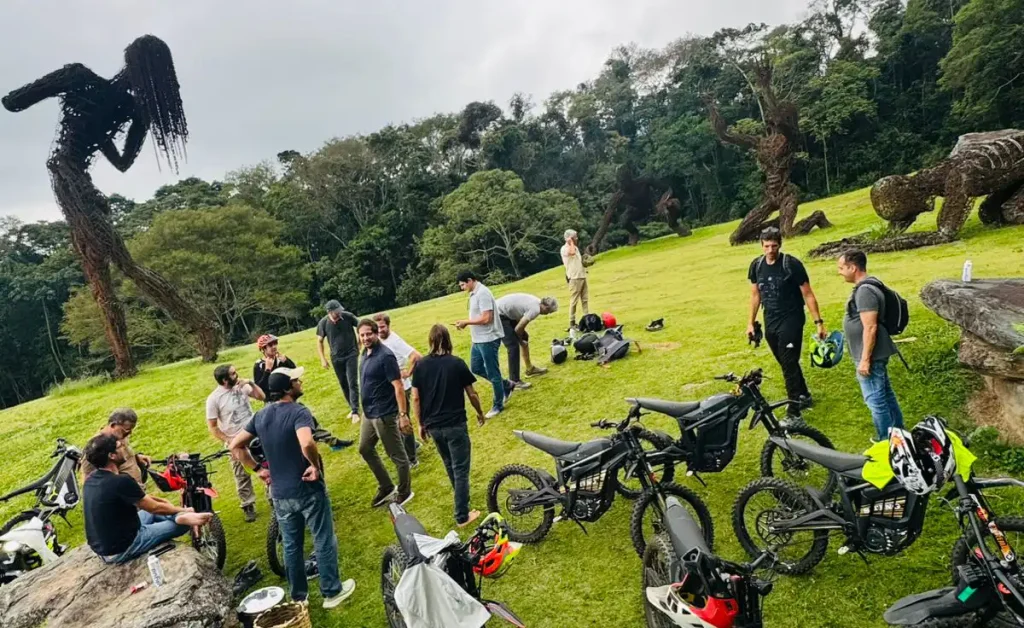
Serendipity: “Allow luck to manifest itself” By Joaquim Monteiro* In an increasingly predictable life, where apps anticipate traffic, the weather, love, fashion... Ibiti Projeto teaches us that analog life is more fascinating than digital life. Here I've learned that ”chance” pulses strongly and how important it is to leave free time in the schedule to simply allow luck to manifest itself. There is an English word that sums up the ”ability to find pleasures by chance“: Serendipity. It's, for example, allowing yourself to walk along a trail and coming across a fascinating waterfall. It's getting lost on a bike and discovering a fantastic route. It's having a coffee at Gaia and, at the next table, finding guests with so many points in common. In other words, it's that unexpected discovery thanks to wit and attention to detail. It's the ability, or art, of accidentally noticing and taking advantage of happy discoveries. It's that unexpected encounter with people, ideas or moments of pure beauty. The SP-Ibiti flight, for example, is not just an air bridge between the Stone Jungle and Paradise: it's a connection with opportunities to experience innovation and sustainability first-hand. Each landing is a spontaneous invitation to discovery, allowing small coincidences to generate great learning, both for the visitor and for the project itself. Allowing yourself to experience the unexpected is a gesture of affection for yourself. It's about trusting and making tangible what life has in store for you. So, as only nice people come here, rest assured that nature has reserved something valuable for you. The most profound discoveries are often found in the unexpected. That's why I strongly believe that staying at Remote or doing programs like Travessia are an invitation to well-being or a path to positive surprise. I recently met Mrs. Nair on a ride to Lima Duarte. Think of a pleasant conversation. I was struck by the genuineness and sincere hospitality of this resident. Nair's accent should be registered as an intangible heritage of Mogol. It's practically a dialect that deserves to be heard. This all happened by chance, and today I think that talking to Mrs. Nair is undoubtedly a great program for anyone visiting the Village in search of authenticity. She has a sensitivity that would make any happiness expert jealous. In other words, providing free time while in Ibiti is a necessary activity for true encounters to happen and become a memorable moment of the trip. The word serendipity - created in 1754 by the English writer Horace Walpole, inspired by the Persian tale The Three Princes of Serendip - is celebrated in the world of creativity and innovation, valued for its ability to turn the unexpected into an opportunity. In popular competitions in the UK, serendipity was voted one of the public's favorite words, reinforcing its symbolism of happy and unexpected encounters, of insights that arise when least expected. At Ibiti, serendipity seems to spring from the earth. That's why it's worth being open to perceiving, valuing and making the most of the unexpected. It is in this combination of coincidences, conscious choices and chance encounters that ideas flourish, partnerships are formed and the project grows. Every gesture and every presence carries the potential for something extraordinary. And it is in this continuous flow of discoveries that Ibiti reveals its magic, always ready to surprise. *Joaquim Monteiro is a partner at Sertões and an advisor to Ibiti Projeto.
Discover Ibiti and experience nature like you've never imagined
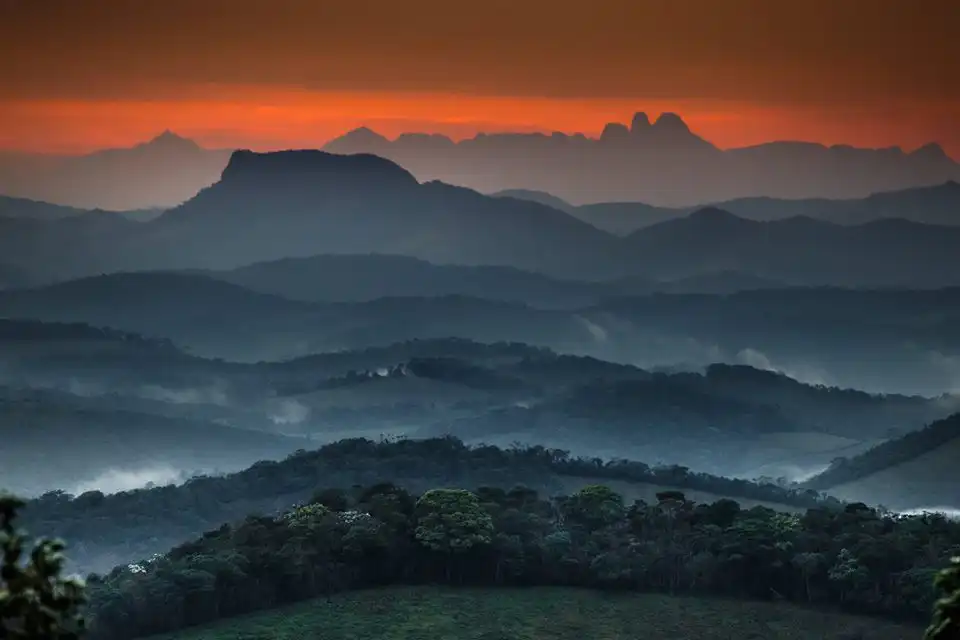
On the edge of the Ibitipoca State Park in Minas Gerais, there is a place that is not just a destination for regenerative tourism with luxury accommodation. Ibiti is a 6,000-hectare socio-environmental project that brings together the regeneration of the Atlantic Forest, exclusive sensory experiences, art, science and its own way of living and celebrating, in the time of nature. Here, former grazing areas have given way to living forests. And each experience stems from the same question: how can we live better, with less impact and more meaning? Art that touches the sky High up in the mountains, monumental sculptures created for the Burning Man Festival in California come to life in dialog with the landscape of Minas Gerais. The setting is ideal for sky watching, intimate programs such as meditation and sound healing, bike or horseback riding, picnics with groups of friends and family or even celebrating a special date in total privacy. Gastronomy from the land With more than 100 varieties of organic food grown by Ibiti Gaia within its own territory, Ibiti practices the concept of garden to table on a daily basis. What arrives on the plate is born there, respecting the soil, the weather and those who produce it. Music in the village At dusk, a 19th century piano echoes in the Gaia Café, in a small mining village called Mogol. There's no rush. No excess. Just music, scenery and the rare feeling that time has stopped so you can listen. Muriquis: science, courage and hope Ibiti is home to one of the most important projects in the world for the conservation of muriquis, the largest primates in the Americas and critically endangered. This is an unprecedented effort that combines science, cutting-edge research, care and long-term commitment. Personalized programs that connect to your essence From the first rays of the sun to nightfall, Ibiti invites you to experience nature at every pace in itineraries developed exclusively for you and whoever else is by your side: bike rides along trails, waterfall baths, special therapies in the spas, with heated pools, outdoor baths, art scattered across the landscape and viewpoints for sunrise and sunset, as well as stargazing. There is also a school, oca, orchard, nursery, café, restaurant, cinema, freshwater beach, lake and much more. Families, children, couples, singles... Everyone is very welcome to visit this “portal of possibilities”. Ibiti has hosted the Sertões MTB Ibitipoca for five consecutive years. It is also home to Muriqui Sounds - a music, art and gastronomy event at the Statues, which is going to its fifth edition in 2026. The Ibiti way of being We often say that Ibiti is almost a country, with its own way of being, thinking and speaking. Here, Portuguese and English mix with an accent full of mineirice. Classical philosophy coexists with community knowledge. Entrepreneurship goes hand in hand with local traditions. At Ibiti, you learn from the past, celebrate the present and reimagine the future. Sleeping is also an experience The types of accommodation reflect different ways of relating to Ibiti Engenho Lodge - an elegant farmhouseVillage - comfortable houses integrated into the village and local lifeRemote - quiet refuges in total connection with natureOca - built by indigenous people from the Xingu, it welcomes groupsGlamping - comfort under a starry sky Worldwide recognition Ibiti shows that it is possible to unite excellence, comfort, culture and real positive impact Sistema B - since 2017 Robb Report 2023 - among the 50 best hotels in the world Condé Nast Johansens 2024/2025/2026 - Excellence in sustainability The Long Run - tourism with purposeWhere it is On the edge of Ibitipoca State ParkLima Duarte - MGHow to get there - Exclusive SP-Ibiti flights on Ibiti's private landing strip Projetoflyflapper.com- Exclusive helipads- By car: access via the LMG-871 highway Find out more ibiti.com @ibitiprojeto @ibiti.village @ibitiengenho Reservations (32) 98449-2200 (32) 99984-7626 IBITI A place to feel and leave different
Ibiti regenerates more than 1,200 hectares of Atlantic Forest
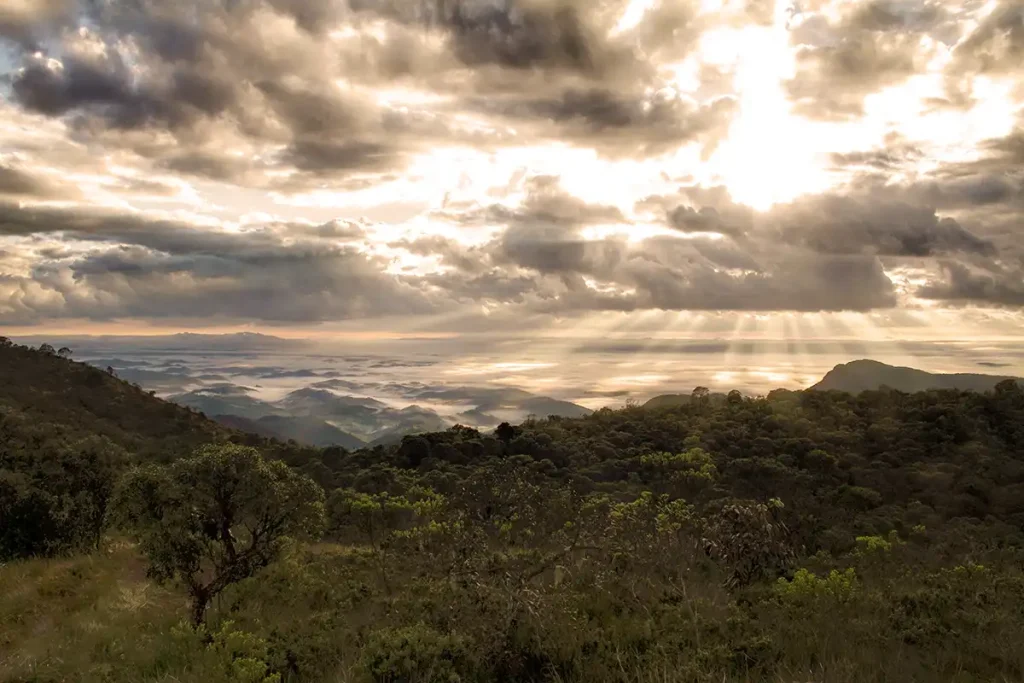
For centuries, the Atlantic Forest has been pressured by human occupation, livestock farming and monocultures. Around Ibitipoca it was no different: pastures replaced the forest and with them came the isolation of the fragments and the loss of biodiversity. But where many saw degradation and abandonment, Ibiti Projeto decided to bet on nature's time. And with that, it promoted a silent revolution. Forty years on, the results are there for all to see. The inhabitants of the region recognize the fruits of this work in the reinvigorated landscape. This perception is now backed up by the figures in the technical report “Temporal analysis to characterize land use and vegetation cover”, based on images from the Sentinel 2 satellite. The document from Bioflore, a company specializing in environmental monitoring, commissioned by Ibiti, revealed that more than 1,200 hectares of new forest have grown in the territory, equivalent to almost the size of the entire Ibitipoca State Park (1,488 hectares). These figures are the effects of an innovative conservation proposal, in the view of Heitor Filpi, CEO and co-founder of Bioflore. “From the point of view of conservation, it was a super innovative proposal, because they bought up the surrounding farms, which were no longer making much profit, and promoted this regeneration,” he observes. “And then this process of vegetation regeneration began, because the livestock was leaving with the farms. And the fauna, as we can already see in that region, is also coming back.” Regenerating is revolutionary ✔️ 96% of Ibiti's total territory (5.906 hectares) are under regeneration ✔️ 62% of this total is covered by native forests ✔️ 21% is occupied by candeal (a forest formation typical of high-altitude fields, with trees of short stature, predominantly the candeia species) ✔️ Only 15,2% is pasture, and less than 1% is occupied by improvements, roads and bodies of water ✔️ 63% of the vegetation is more than 38 years old, an indication of ecological stability and high conservation value ✔️ 1.281 hectares (equivalent to 85% of the Ibitipoca State Park area) have been continuously regenerated since 1985, transforming degraded areas into interconnected forest corridors. ✔️ More than 1,600 hectares of core areas (central parts of the fragments most protected from human interference) in 40 years ✔️ Conservation Index* increased from 48 (1985) to 67 (2023) * Bioflore's Conservation Status Index (IEC) is calculated using remote sensing and geotechnologies. The same study indicates that, without Ibiti, the region would today have less vegetation cover, less connectivity and greater fragmentation. In the surrounding area, while forest regeneration amounted to 5,322 hectares, deforestation amounted to 3,738 hectares. Within Ibiti, regeneration far outstripped losses. Regeneration model The report is the product of the first part of Bioflore's work, which consisted of “estimating and reporting the positive impacts generated by conservation and preservation efforts”. A field study will be carried out in 2026 to complement the research. The results show that previously isolated fragments have become connected, central areas have expanded and the so-called “edge effect” has diminished. What seemed unfeasible has become a model for regeneration. “It was a very positive surprise,” says Bruno Nani, Bioflore's CMO. “We already knew about the importance of the Atlantic Forest, but to see how far Ibiti has come in this time is impressive. We're talking about a global biodiversity hotspot, where natural regeneration has been embraced as a life project.” The report also highlights that the absence of the Ibiti Project, in a hypothetical scenario, would result in a drastic loss of natural vegetation, fragmentation, connectivity and core areas, reinforcing its fundamental importance for the environmental integrity of the region. What is edge effect? The edge effect is the set of physical, chemical and biological changes that occur in the transition region (or “edge”) between two different types of ecosystems (such as a forest and a pasture or deforested area). This transition creates an environment with intermediate or completely new characteristics, which can be detrimental to the quality of the original forest habitat. The Bioflore report showed that, with the conservation work carried out for decades by Ibiti Projeto, the edge effect has been significantly reduced in the region. Ibiti Regenera For Clariane Maranho, a biologist at Ibiti, transforming the perception of this regeneration, shared by the mountain's oldest inhabitants, into measurable data was a decisive step. “Those who live here could already see the change: the return of the animals, the forest growing where it used to be pasture. But we needed figures to give us credibility and transparency,” he explains. Thus was born Ibiti Regenera, an initiative that seeks to neutralize the environmental footprint of guests and employees and, at the same time, financially support conservation projects. Neutralizing carbon here means more than offsetting emissions: it means restoring ecosystems, strengthening communities and building a new model of coexistence with the Earth. “It's not just about carbon,” emphasizes Clariane. “It's about keeping our fauna reintroduction, soil recovery, firefighting and waste management programs alive. Ibiti Regenera is the way to continue this care.” The landscape around Ibiti still reveals scars: degraded areas, erosion, small patches of forest. “It was a region marked by coffee-growing and then livestock farming, activities that had no vocation for that soil,” explains Heitor Filpi. “This hinders natural regeneration and compromises the water and ecological balance.” It is in this scenario that Ibiti stands out as a living laboratory. “What we see here is revolutionary, because it's not just about preserving what's left, but restoring it,” adds Heitor. “And restoring on a large scale, showing that it is possible to return the forest to its place of origin.” Forest gardener Among the stories that help to understand the impact of the report is that of the paca, a discreet and nocturnal animal, which, by burying seeds, ensures that new trees will sprout in the future. It is, to a certain extent, a metaphor for Ibiti Regenera itself. “It needs continuous shade, it doesn't go through large clearings. That's why the more it's connected to the forest, the bigger it is.
Ibiti community turns sunrise into a ritual
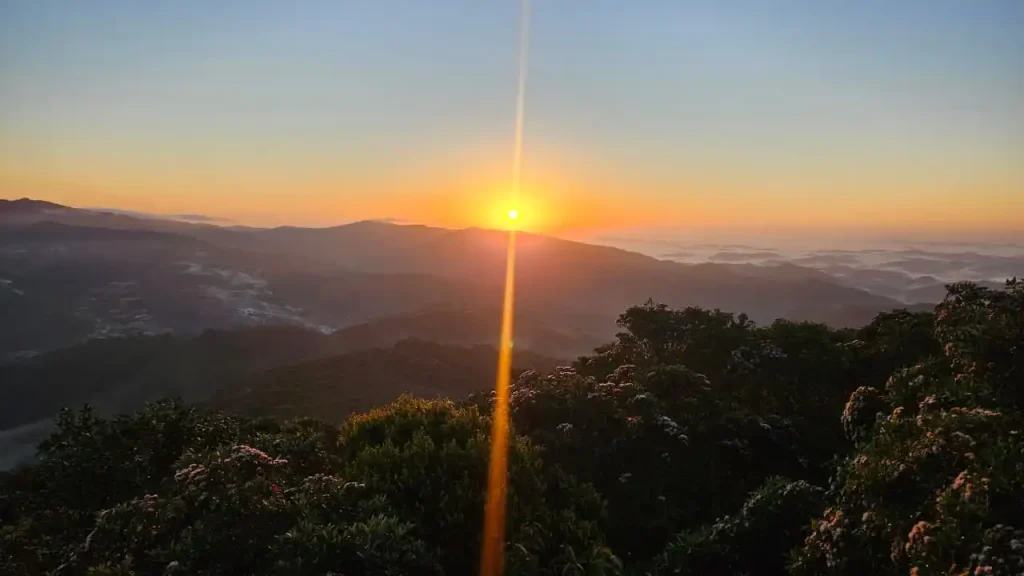
In Ibiti, sunrise is celebrated all year round. The same horizon seen from many places, by many eyes, on different days. For many, it's a habit that never loses its charm. And that's why the scene inspires many clicks made by those who wake up early every morning: the fresh start of a new day. When the community was invited to share images of the sun rising in Ibiti - to illustrate the New Year's Eve celebrations, which were named Ibiti Rise - the response was spontaneous. In a few moments, dozens of photos appeared. Different angles, unique colors, moments captured by each special eye. What unites them all is not the technique, but the feeling, the perception that there, in that first ray of light, there is something that awakens. This multiplicity of views says a lot about the spirit of Ibiti, a place of freedom, where each person experiences nature in their own way, but sharing the same essence. The sunrise, chosen as the symbolic image of Ibiti Rise, translates exactly that: the new year doesn't start with fireworks or excess, but with awareness and presence. See the images sent by Ibiti employees to the Community group at the request of Ibiti News! A New Year's Eve to feel The New Year's program at Ibiti Village, one of the accommodation concepts at Vila Mogol, was designed as a journey connected to nature. Days that invite deceleration, encounter and conscious celebration. Between yoga practices at dawn, a circuit through the waters of Ibitipoca, harvesting in Gaia, farm-to-table lunches, piano concerts and evenings filled with live music, time takes on a different rhythm. A rhythm that respects the body, the landscape and natural cycles. The point of convergence comes on December 31, with the Ibiti Rise New Year's Eve celebration. The planting of peace, the sound healing at dusk and the arrival of night at the Oca create the space for crossing the year with intention. The soundtrack is provided by the band Reggae Feelings, bringing lightness, dance and positive vibes to the new year. Turn the year over like opening a new page The next day, Ibiti invites you to meditate by the water. Everything suggests that the New Year's celebrations become a state that lasts. Just like the sunrise, which doesn't happen suddenly but reveals itself little by little, Ibiti Rise proposes a beginning that matures over time. An invitation to go through the year with more clarity, more connection and more truth. At Ibiti, the new year begins from the inside out. Come and experience Ibiti Rise Reservations Center: (32) 98449-2200
Marcelo Gleiser at Ibiti: the urgency of coexisting with the planet
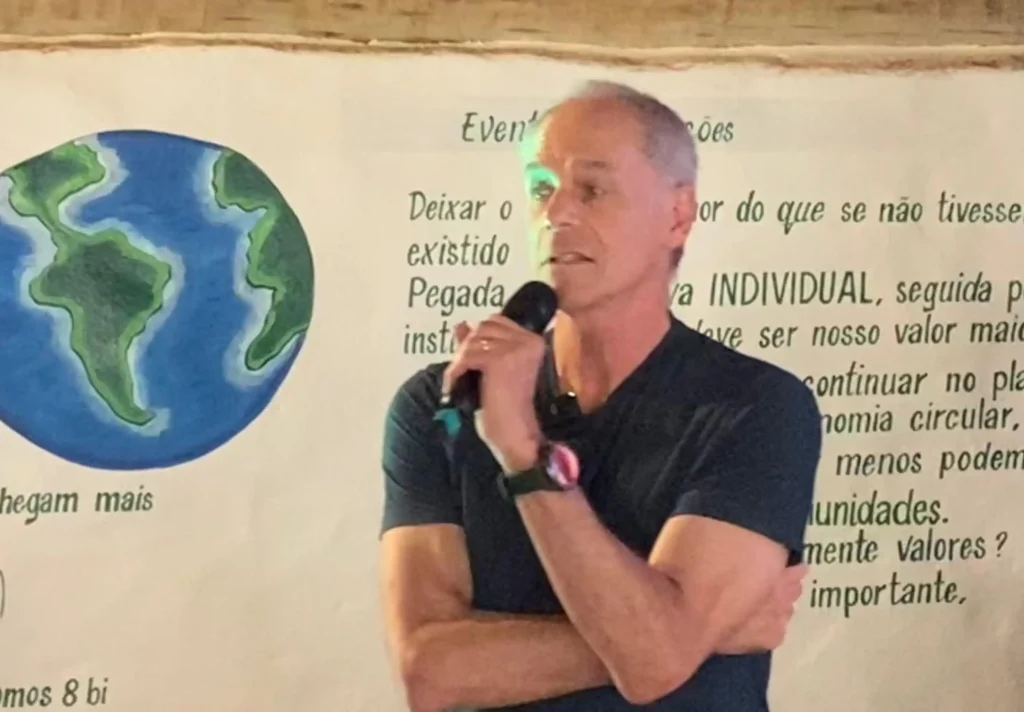
Award-winning physicist, professor and writer, Marcelo Gleiser was the first Latin American to receive the Templeton Prize, often referred to as the “Nobel of spirituality”. In August 2025, he spent five days immersed in Ibiti Projeto, living the routine of the community, exploring nature and sharing profound reflections on science, spirituality and the future of humanity. The following interview was given at his last breakfast at the Yucca restaurant, before he left for one of his daily rituals: running along the trails in the middle of nature. In between walks and recording a documentary about his career - with scenes shot in Ibiti by João Jardim's team - Gleiser also gave a talk open to the community, lasting around two hours, in the Comuniversidade tent, inside Ibiti Village, in Vila Mogol. “We really have to celebrate the privilege of being alive on a planet like this. From what I've studied of the entire universe, there will never be another planet like Earth. It's time for a new awakening for humanity: the awakening of coexistence with the planet.” Ibiti News - What did you experience in Ibiti and what touched you most about this project? Marcelo Gleiser - The word that comes to mind is resplendent. There is an impressive dance of light, forest and water here. I was able to visit some of the main sites and was deeply enchanted. Isgoné, for example, is a place where I can imagine spending a week writing in total seclusion, something I love and need. Ibiti has an almost magical quality of enticing people to reconnect with nature, which is exactly what we need most today. I was also very touched to see the joy with which people work here. I spoke to guides, collaborators and the resident musician, Lucas Soares, and saw genuine happiness in being part of the project. It's a real co-creation of community, and that's the invitation Ibiti extends. What about the statues? I'd seen pictures, but nothing compares to the face-to-face experience. When I arrived behind them, I physically felt my heart squeeze with emotion. The idea of including the various faiths is breathtakingly beautiful and fluid. Ibiti is a place that opens a portal between the mind and the heart. Here you experience a spirituality that is not linked to a specific religion, but to something visceral, that comes from within and transcends labels. It's the feeling of belonging to something much bigger than ourselves, but of which we are a part. Walking through the forests, on the trails and around the statues allows us to open up to the world in a spiritual way. What rituals do you practice on a daily basis? I practice yoga every morning and do breathing exercises a few times a week. I really enjoy running and walking on trails, especially in the mountains. For me, this is an act of devotion to nature. If you believe that nature is your mother and that you are part of it, being physically and spiritually present in this movement is a form of dynamic meditation. When I enter a trail, I say: “welcome to the temple”. That's why I've practiced running 50, 80 kilometers. It's a pilgrimage of the soul. The body is exhausted after a certain point, and what remains is the essence. Do you believe in the soul? I've tried a lot, but today I prefer to believe in our capacity for wonder. We human beings have something precious: the ability to dream of tomorrow and to marvel at the mystery of existence. If you want to call that soul, fine. For me, this emotion of being alive - not just to eat or sleep, but to feel, reflect and exist in depth - is the most precious thing there is. What do you have faith in? I have faith in humanity. I believe we'll manage. We're going through one of the most difficult periods in history because of global leadership, but that's exactly why I believe in a turnaround. The pendulum will swing the other way. We need to be reborn as humanity, because if we continue on this path, the future will be very difficult for the next generations. Ibiti's work, like that of so many other initiatives around the world, is helping to transform this reality. “We have the incredible ability to dream of tomorrow and marvel at the mystery of existence.” - Marcelo Gleiser
Exhibition at Oca: fine art celebrates Ibiti
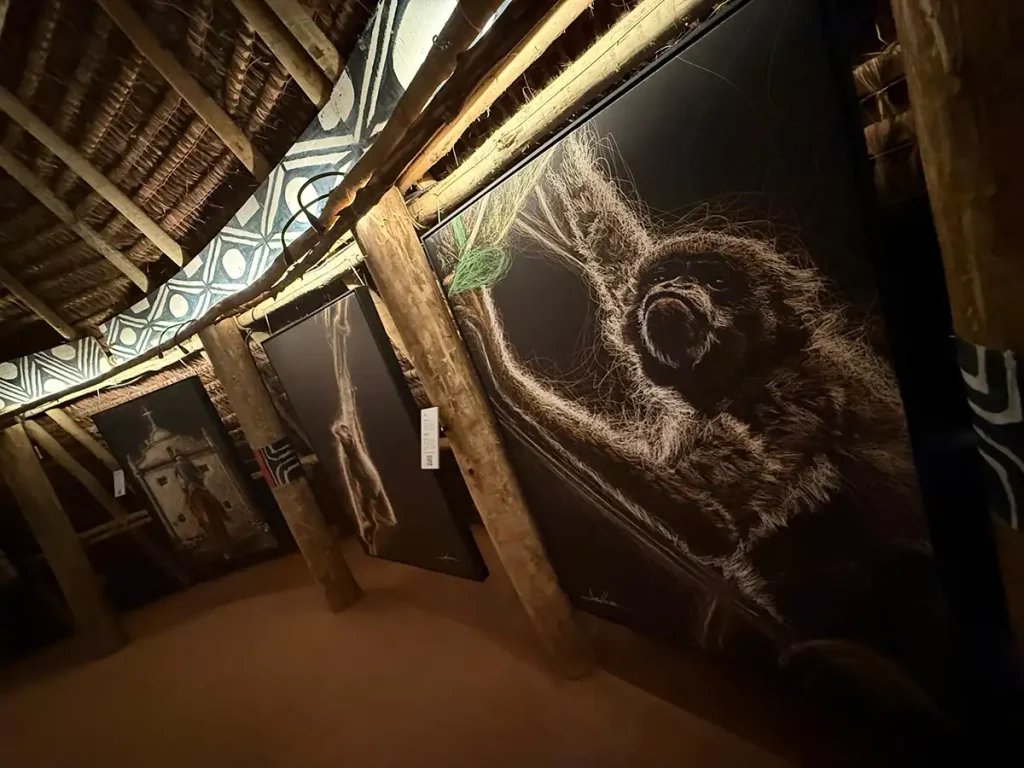
Bringing together art, philosophy and purpose. This is the intention of the exhibition at Oca Eudaimonia Ativa: Lines that bloom, a series of fine arts created by visual artist Lucas Corrêa. The invitation to Lucas came from a clear purpose: to value, through art, the enterprises that shape Ibiti, each one led by people from the region, guardians of the local culture, hospitality and paths of regeneration that the project cultivates. To create the works, the artist delved into Ibiti's vast image bank and selected, in record time, photos that reveal soul, stories and belonging. On these images, he applied his signature graphic intervention technique: scribble, an organic and intuitive digital drawing that transforms each record into a contemporary visual narrative. “I try to concentrate the strokes on what is most important in each image, highlighting the brightness in the lighter strokes, which refer to what is best about Ibiti: the movement, the energy of the place,” says Lucas. Inspired by Greek thought, especially Aristotle, Active Eudaimonia is based on the idea that human flourishing is a practice, a continuous action, and not a static state. The exhibition translates this principle into an image: what we cultivate, regenerate, learn and share in the world. At Ibiti, this philosophy finds fertile soil. Each development symbolizes a way of participating in the construction of a full life, individually and collectively: from the Bike House to Gaia Produtos Ecológicos, from MIB's care for the muriquis to the education of the children at Life School. “I wanted to insert myself into each development with my lines, feeling part of this movement, with loose and fluid gestures. Each work is also a way of integrating myself into the Ibiti ecosystem with my own identity,” says the artist. Art as a road show: get to know, support, invest The exhibition at Oca also fulfills another function: to present to the visitor, in an aesthetic and touching way, each of the enterprises that sustain Ibiti, opening doors for those who wish to support, invest or participate in this collective construction. Here, art and purpose go hand in hand. A child reading represents the Life School, which can be supported through scholarship funding. A portrait of Carlinhos symbolizes Ibiti Remote - Areião, where local hospitality creates experiences in the mountains. The images of the muriquis connect to the MIB, a fundamental organization for the survival of the species. And so each work becomes an invitation to look, understand and participate. “I hope that everyone who visits the exhibition leaves feeling that Ibiti is made up of real lives, real dreams. And that each dream can be strengthened by those who pass through,” observes Heliane Machado, Ibiti's head of marketing. Lucas Corrêa: The active expression of memory Currently, Lucas explores the scribble technique, in which quick, interwoven lines take on body and emotion, creating texture, movement and narrative in each work. The result is a vibrant aesthetic, in which subjectivity is expressed through freedom of gesture. Lucas Corrêa, 41, is a visual artist who, since childhood, has developed an authorial language marked by freehand drawing and contemporary expressionist lines. His work is born from photographs and reference images, which he gives new meaning through spontaneous graphic interventions. Although he lives in Belo Horizonte, Lucas has a connection with the region: part of his family comes from these lands. Empreendimentos do Ibiti Ibiti Remote - AreiãoRemote lodgings run by Mariinha and Carlinhos. Simplicity from Minas Gerais and a full connection with nature Engenho LodgeThe farmhouse where hospitality, care and regeneration meet under the direction of Cláudia Baumgratz Ibiti AstrosExperiences observing the sky with Diego Gonçalves: science, enchantment and the cosmos at your fingertips MIB - Muriqui Biodiversity InstituteThe protection of the largest primates in the Americas. An essential project to regenerate the Atlantic Forest Gaia Produtos EcológicosOrganic and regenerative agriculture. From land to plate, with respect for the natural cycle Ibiti OrquídeasOrchids and bromeliads under the care of Guilherme Salgado. Beauty and biodiversity in harmony Ibiti Horses Experiences with horses that revive the ancestral bond between human, animal and landscape. Under the command of Igor Sulex Life SchoolThe school that pulses in Vila Mogol, directed by Heliane Machado. Integral education, nature and community Bike HouseCommanded by Miguel Giovannini, it leads to experiences of freedom and well-being as you pedal with e-bikes along the trails of Ibiti Ibiti VillageUnique model of accommodation in restored houses in Vila Mogol: community, authenticity and hospitality.
Ibiti Journal: What's new in the mountains this spring | summer 2025/2026

The Ibiti Journal is getting another edition, made to be enjoyed preferably next to a good cup of coffee, in a hammock or in the middle of nature. The big news this time is that Ibiti Journal No. 4 is also printed in English, in addition to the Portuguese version, guaranteeing the complete experience for foreigners visiting Ibiti and for those accompanying us from other continents. Large-scale regeneration Among the highlights of this issue is the full article on what Bioflore researchers have found through satellite monitoring: Ibiti has already regenerated more than a thousand hectares of native forest. The study, commissioned by Ibiti, proves, in data and images, what the eyes of the community already saw: where there used to be pasture, there is now forest and a new model of a possible future. International voices English traveler Henry Cookson answered our questions from the other side of the world, explaining why he wants to build a house in Ibiti. World-renowned scientist Marcelo Gleiser talks about spirituality and nature over breakfast at Yucca, after spending five days immersed in the project with his family. Local voices Directly from Mogol, Dona Nair enchants those who stop to listen to her stories with a unique accent that won over Joaquim Monteiro, a member of the Ibiti Council and author of the article on Serendipity Curious? Open the Journal at the link below to read it! We also visited some of the families who left the Engenho to find out how they live today, and had a good time reminiscing with Seu Benjamin, Seu Artur, Darinho and Celeste! From the Engenho's kitchen, Dona Odette reveals some of her secrets for preparing the traditional canjiquinha. Juninho, a guide and photographer, tells his stories about learning English in the United States. Natural art: banana mandalas And to top it all off, this issue is illustrated with banana mandalas. Have you ever heard of them? The idea came about during an unexpected meeting in the Ibiti Village cafeteria. The intention was to have mandalas made by the Life School children illustrating the newspaper, and the project came to life when the couple Isabela and Luiz Adolpho, parents of little Elis, got together to create the banana tree mandala workshop.Go and see how it's done, we'll teach you too. And that's it: lots of meditation on the mantras of Minas Gerais: ommmmmmm uaaaaaai sôôôôôô... Read the Ibiti Journal #4 Portuguese Version (PDF) English Version (PDF) Read the other editions in Portuguese and English News from the mountains: Read the Ibiti Journal - Autumn | Winter 2025 Ibiti Journal 2: What's new for spring/summer 2024 Ibiti Journal: Discover the first edition of the Ibiti Projeto newspaper
Secrets of the forest: get to know Ibiti's trees and their stories
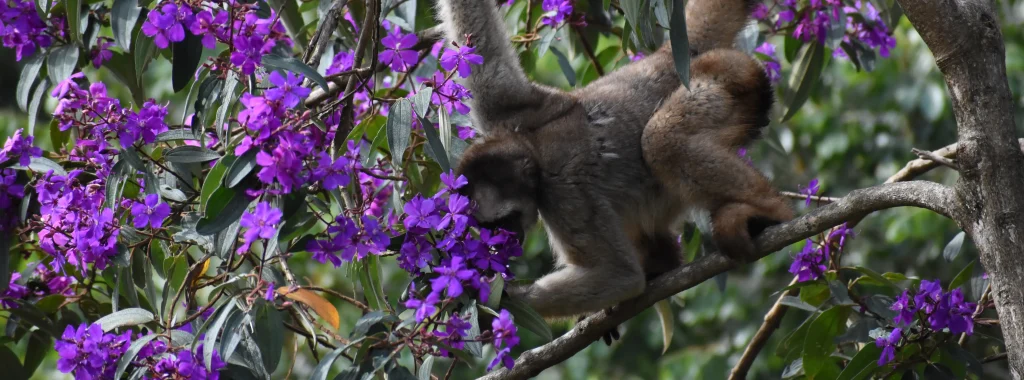
Walking along the Ibiti trails is also a journey through time: each tree tells a story of regeneration, shelter and beauty. Their preservation begins with knowledge and respect for the environment. Ibiti's trees hold legends, meanings and are true guardians of the forest, providing shade, shelter and food for all living beings. And, of course, they are enchanting! Researchers who have been here have catalogued hundreds of species, including ipê-amarelo, quaresmeira, paineira, embaúba, mulungu, candeia, among many others. Many of these trees are marked with plaques, making them easy to recognize during your walk. Others are the protagonists of stories told by guides and local residents. Here are some of the most emblematic trees within the Ibiti Projeto territory, all recorded by the passionate eyes of visitors and project collaborators! Ipê-amarelo Native to South America and very present in Brazil, the ipê-amarelo is celebrated for the exuberance of its flowers which bloom at the end of winter, making it a true national symbol. Between August and September, it colors the forests of Ibiti and enchants visitors. The flowers, considered edible, are used by some chefs in gastronomy. And they attract various insects, bees and birds, especially hummingbirds, which play an essential role in pollination. Quaresmeira An ornamental tree native to Brazil, especially the Atlantic Forest. It usually blooms during the Lenten season, which gives it its popular name, attracting attention in the middle of the forest with its showy purple or pink flowers. Araucaria At the Mirante do Cruzeiro, 42 araucaria saplings have been planted, forming the symbol of peace. This species, which stands out in the landscape on the way to Areião, has existed on the planet for around 200 million years. It flowers between October and December. It produces pine cones that contain the pine nut, which ripens between April and June and serves as food for animals, such as the blue jay, and humans. Jequitibá At Ibiti, two saplings were planted: one at Engenho Lodge and the other at Vila Mogol, in front of the Yucca restaurant. An Atlantic Forest heritage tree, the jequitibá - which can live for more than 500 years - reflects Ibiti Projeto's commitment to longevity and sustainability. It is among the tallest trees in the Brazilian flora, reaching heights of 50 to 60 meters. It provides shelter and food for various species of fauna, which take advantage of its fruit and the protection of its high branches. Mulungu Present in several areas of Ibiti, this tree is endemic to Brazil and is known as much for its medicinal properties as for its beauty. Also called parrot's beak, it is traditionally used as a natural calming agent and can be found in teas, capsules or tinctures. Between June and September, it blooms in vibrant red tones while shedding its leaves, attracting mainly hummingbirds. Sapopema (Tree of the Seven Horsemen) A sapopema tree over 350 years old with a hollow trunk arouses the curiosity of those who pass by on the trail in the middle of the forest near Garnet. Legend has it that, during a heavy storm, seven travelers found shelter inside, arousing curiosity about the thickness of its hollow trunk. Its fruits are woody capsules that open to release winged seeds. Candeia Native to the Cerrado and Rupestrian Fields, the candeia has resistant and aromatic wood, rich in essential oil used in folk medicine and the cosmetics industry. Its white or yellowish flowers bloom between March and May. Juçara The juçara palm is essential for forest regeneration, but is threatened by palm heart extraction. In Ibiti, its fruits are used to produce juçaí (similar to açaí), jellies and ice cream, while the seeds are reintroduced into the wild, encouraging conservation. In Vila Mogol, several seedlings were planted with the involvement of the community, which also takes part in the Juçara Festival. Paineira Among the statues and the Garnet, a majestic specimen of paineira stands out, whose trunk and flowers attract attention in the landscape. It blooms profusely in summer and fall. The fruits are large and, when ripe, release silky millet.
Casa Einstein: stay in Ibiti and watch the sky sleep with you
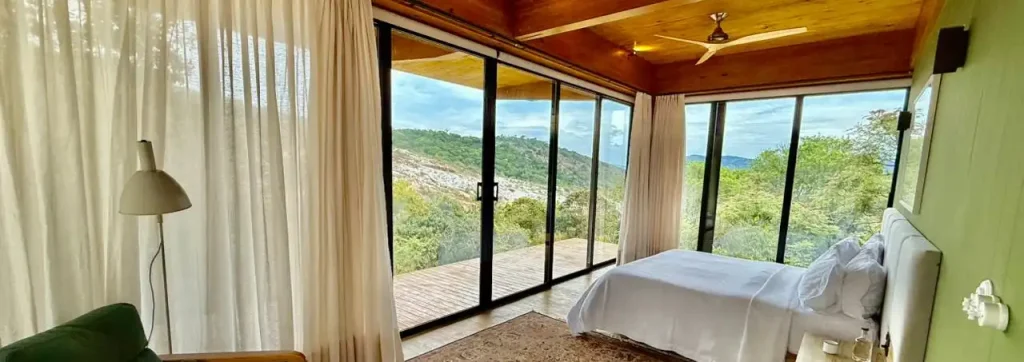
There are places that seem suspended between time and space. High up in the mountains in Vila Mogol, part of the Ibiti Village concept, Casa Einstein (or Glass House, as it is also known) is one of those places where nature is not just around, but everywhere. The sunrise comes through the glass walls, the moon rises on the horizon in front of the bed, and the wind crosses the deck as if it were part of the architecture. Modern, minimalist and transparent, the Einstein House invites you to an essential kind of experience: to look outwards and, at the same time, inwards. A tribute to curiosity and creation Named after Albert Einstein, the house celebrates the physicist's free, creative and contemplative thinking. Its transparency is also philosophical. Every detail seems to spark thought. A space where the privilege is to watch the sky sleep with you. Residence in Alto Mogol With 170 m² of fluid, integrated space, the house accommodates up to two people with total privacy and 360º views of nature. The bedroom opens onto the forest and the Victorian bathtub facing the green invites you to immerse yourself in nature. Outside, a trunk-shaped shower massages the body with just the right amount of pressure: a real ritual. The hollow iron spiral staircase is another decorative element on the façade of the house, leading to the green rooftop, designed to contemplate the sun and the moon, the sky and the stars. And time seems to expand. A call to contemplation, to observe the slow movement from dawn to dusk. Eco-conscious comfort Casa Einstein combines privacy, design and purpose. Ideal for couples, it welcomes both those looking for a regenerative weekend and those who want a creative season, between the inspiration of the landscape and the comfort of a cozy home. The project translates Ibiti's minimalist spirit into pure lines and design pieces in contrast with exclusive ones made in the project's own joinery. The entire sustainable structure involves responsibly managed wood, solar energy and ecological sewage treatment. Automated curtains and intelligent lighting balance technology and simplicity. The space is also equipped with a king size bed, functional kitchen (fridge, coffee maker, water purifier), bathrobes, ecological amenities, towel warmer and Wi-Fi. Casa Einstein - Ibiti Village, Vila Mogol 170 m² | 2 people | 1 suiteRooftop with moonrise and sunrise viewsOutdoor shower Daily rate includes breakfast, lunch and dinner at the Yucca restaurant in Ibiti Village, as well as morning yoga classes Book this experience! Reservations Center: (32) 98449-2200
Paul Watson in Ibiti: the sea meets the mountain before COP30
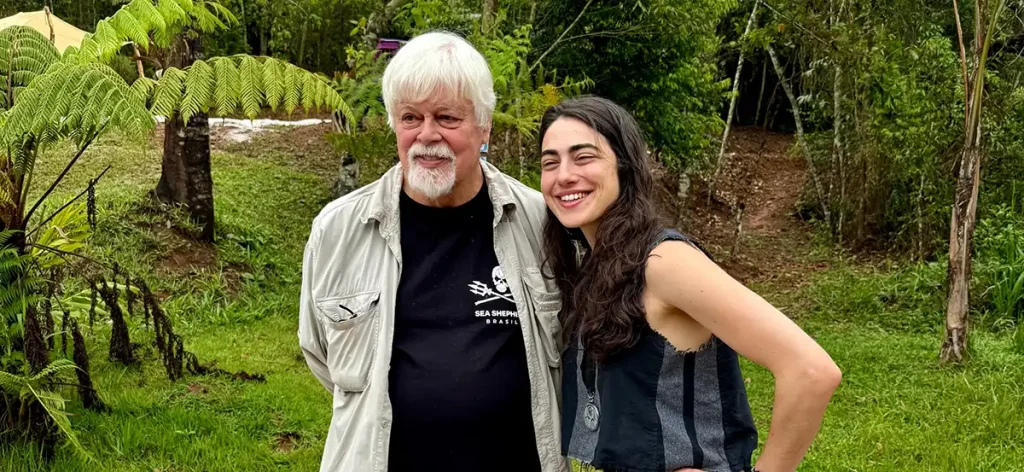
Before Belém hosts leaders and environmentalists from all over the world at COP30, the mountains of Minas Gerais have already begun to echo the conversations that matter. High up in the mountains, Ibiti Projeto has made room for a rare immersion: four days of dialog and experiences with Paul Watson, founder of Sea Shepherd and one of the most radical and influential ecological activists on the planet. Between vegan meals and discussions in symbolic Ibiti settings - such as the Statues, the Oca, Café Gaia and Praia do Mogol - Watson advocated a profound paradigm shift: abandoning the anthropocentric view, which places human beings at the center of everything, and adopting a biocentric view, which recognizes the interdependence between all forms of life. “For thousands of years we have seen the world from an anthropocentric point of view, as if everything was about us, as if we were the only species that mattered. But we are only part of the whole. The species we share the planet with are more important than us, because they can live without us human beings, and we can't live without them. We depend on insects, trees, birds, phytoplankton and zooplankton for our very survival,” said Watson during the meeting. With his direct and provocative tone, the captain, who has been sailing the seas in defense of marine life for more than five decades, transformed Ibiti into a symbolic port, where the ocean met the mountains and activism mixed with contemplation. Alongside navigator Tamara Klink and her mother, Marina Klink, filmmaker Gert-Peter Bruch (Planète Amazone), Nathalie Gil (president of Sea Shepherd Brasil) and other names committed to the cause, Watson took part in dialogues that addressed global ethics, biocentrism and the old-new ways of coexisting with the planet. Culture, ethics and the limits of tradition In one of the talks, Tamara Klink questioned the use of the word “culture” as a justification for practices such as fishing. “Many argue that hunting and fishing are part of the local culture. But when these peoples already have access to alternatives, such as supermarkets and other food sources, to what extent can culture justify destruction?” asked Tamara. Watson answered without hesitation: “Culture cannot justify cruelty. It can't justify ecological destruction. This is the 21st century, we don't need that anymore. The British no longer need to hunt foxes, the Spanish no longer need bullfighting. Nothing can be justified by culture when it involves suffering and unnecessary death.” A meeting before the summits The event, held between October 31 and November 3, was a rehearsal of a new ecological paradigm, born not from conferences and official speeches, but from the meeting between people who live what they stand for, as is the case with the group that met in Ibiti, especially the partners of the Naveia brand, involved in supporting and organizing the event. Between a coffee at Gaia and a chat by Praia do Mogol, ideas emerged that question not only activism, but the very meaning of being alive. Ethics, art and nature merged in the Minas Gerais music played on the violin and accordion during dinner at the Oca, in the film screening at the Cine Mazzaropi and in the procession of Life School children through the streets of Vila Mogol: a reminder that the future is also educated by example. For Ibiti Projeto, which has been consolidating itself as a territory of regeneration and freedom, the meeting reinforced its vocation: to be a space for listening and experimentation, where the dialog between human beings and the planet can be rebuilt. No blue, no green The motto “No blue, no green”, which Sea Shepherd will take to the COP30 agenda, was also echoed in Ibiti. The phrase sums up the essence of the movement that defends the interdependence between oceans and forests, reminding us that the health of the planet begins with the balance between water and life. The campaign gained national prominence when the SOS Oceano coalition (which brings together organizations such as Sea Shepherd Brasil) launched, in partnership with the Droga5 agency, a version of the Brazilian flag without the color blue, symbolizing the marine crisis. The initiative, presented during Rio Ocean Week, warns of the collapse of aquatic ecosystems and reinforces the global goal of protecting 30% of the oceans by 2030. Water is life Inspired by Watson's presence, Ibiti Projeto installed a symbolic plaque on Praia do Mogol, reaffirming its commitment to life and the waters that are born there: Ibiti's Commitment to the Ocean Here, where the rivers are born, we recognize that the ocean begins: from the springs of the Paraíba Basin to the Rio da Prata and beyond. In homage to Captain Paul Watson, guardian of the sea, we commit ourselves to taking care of these waters so that they reach the ocean pure, alive and free. “Intelligence is the ability of a species to live in harmony with its environment”Captain Paul Watson A call to action Between profound reflections and symbolic gestures, the meeting in Ibiti left a powerful reminder: the regeneration of the planet begins within each one of us. For donations and volunteering: Sea Shepherd Brasil
The Long Run: Ibiti hosts global meeting on regeneration
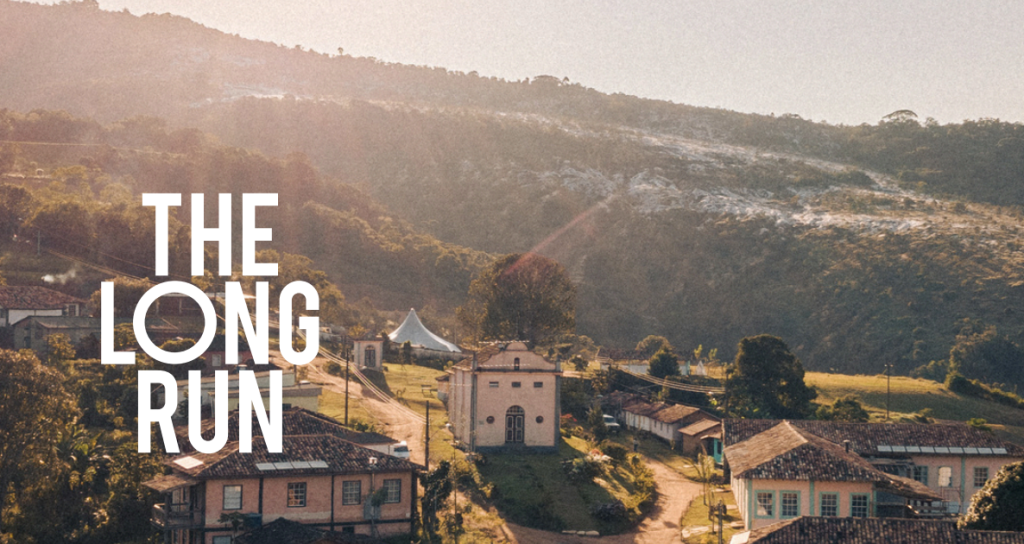
Development and nature go hand in hand. This is the motto of the Annual Members Meeting 2025 of The Long Run network, which will take place from October 26 to 30, 2025 at Ibiti Projeto, in Minas Gerais, bringing together some of the most committed destinations on the planet with conservation, culture, community and conscious commerce: the 4Cs that guide the network's philosophy. Founded under the umbrella of the Zeitz Foundation, The Long Run connects and supports enterprises that act as guardians of ecosystems and agents of social transformation. Today, the network protects millions of hectares of natural areas around the world and influences policies, practices and investments aimed at positive impact tourism. The central theme of this year's meeting is “Resilient Commerce for Lasting Impact Across the 4Cs”. For five days, Ibiti will be the setting for panels, immersions and experiences that unite business and nature, exploring themes such as “Entrepreneurship and inclusion as drivers of regeneration”, “Connecting landscapes and leaders for systemic change”, and “Ethics, integrity and the future of conservation”. Participants Among the names confirmed are Stephan Bruckner (Wolwedans, Namibia), Roberto Klabin (Caiman Pantanal, Brazil), Thais Corral (Sinal do Vale, Brazil), Michael Dyer (Borana Lodge, Kenya), Philippa Roe (Six Senses Laamu, Maldives) and Wouter Jordaan (Tswalu Kalahari, South Africa), as well as representatives of biological reserves, private islands and regenerative initiatives from Latin America, Africa and Asia. The meeting's experiences include sunrise yoga, trails through Ibiti's waterfalls and forests, visits to Vila de Mogol, meetings with local entrepreneurs and a special stop at Casa dos Muriquis, where biologist Fabiano de Melo presents the pioneering assisted reproduction project for the largest primate in the Americas. The “Beyond the Obvious” panel will feature Claudia Baumgratz (Ibiti Engenho Lodge), Joaquim Monteiro (Sertões MTB) and Alex Soderberg (Ibiti Vegan), discussing how Ibiti extends its mission of regeneration through events and experiences that inspire different audiences. On the right track “Hosting The Long Run meeting at Ibiti is confirmation that we are on the right track. We share with this community the belief that regenerating is a verb that is conjugated with actions, and that tourism can be a powerful force for transformation.” “Regenerative destinations lead by example, showing that tourism can be a force for good. Our members are not afraid to ask tough questions, talk about failures, share lessons learned and build on them, because real progress requires honesty and courage. After all, the value we offer guests lies in the uniqueness of our landscapes and the authenticity of our connections, which makes us natural guardians of ecosystems, cultures and the communities that protect them.” Regarding the future and the impact of the event, Johanna Barba says: “We hope that participants will leave Ibiti inspired by both the place and the people. The program has been designed to reflect Ibiti's bold spirit, its creativity in building community, its deep respect for nature and its celebration of culture in all its forms. These days are designed to spark new ideas and challenge us to think differently about regeneration in practice. But more than that, we hope everyone leaves with a renewed sense of connection to each other and to the shared mission we have as members of The Long Run. What makes this community special is its authenticity: a space for honest exchanges, without ego or pretension, where we can reconnect, recharge our energies and strengthen our collective capacity to create positive change.” The closing speech will be given by Hugo Cambraia, CEO of Ibiti Projeto, presenting the Ibiti Regenera program, a long-term initiative that symbolizes the project's commitment to the next 2,000 years of regeneration. The meeting of The Long Run in Ibiti represents the convergence of a community that collectively dreams, works and plans for the future.
Spinoza's portal: Nature as a temple
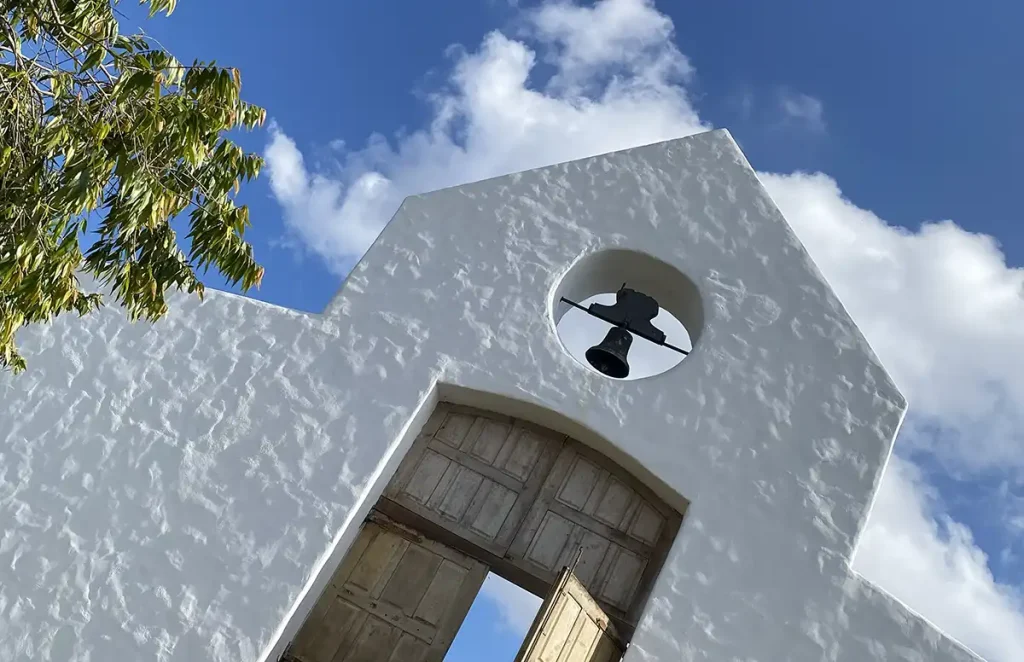
Between philosophy and infinity, a symbol stands out at the top of Ibiti. At the top of Chapadinho at an altitude of 1,200 meters, a white and silent structure invites contemplation. It is the Portal of Spinoza, which combines architecture, philosophy and spirituality in perfect harmony with the landscape. From afar, the façade resembles that of a church. Up close, it reveals a monumental six-meter-high door, acquired more than 20 years ago. The bell rests at the top, completing the scene that unites the sacred and the earthly. The vision behind the Portal The inspiration came from a simple image. Renato Machado, creator of Ibiti Projeto, saw a church façade in the Northeast, remembered the old doors and, as he was reading "Spinoza's Secret", came up with the idea for the building. "You open the portal and see God, because if you can't see God in that wonderful view, you won't find God anywhere," he said, agreeing with the philosopher. Here, the beauty of nature is the very experience of the divine. Harmony and contemplation According to engineer Hugo Cambraia, the portal follows the proportions of the golden ratio, a principle that governs the most harmonious forms found in nature and the arts. It is 16 meters long, 11 meters high and just 1 meter wide, measures that reflect perfect balance and proportion. Made of masonry, the monument fits into the terrain, from where you can see a 360-degree panorama. From there you can see the eastern slope of the Ibitipoca State Park, Areião, Pico do Peão, the Pão de Angu and Cabeça de Formiga hills, the town of Pedro Teixeira and, in the distance, the lights of Juiz de Fora. On clear days, the view reaches as far as Pico da Bandeira, in the Serra do Caparaó. Deus sive Natura The name of the Portal pays homage to Baruch Spinoza (1632-1677), the Dutch philosopher who redefined the notion of God and inaugurated a new form of spirituality. For Spinoza, God and Nature are one and the same reality, an infinite substance that manifests itself in everything that exists. "Everything that exists exists in God, and without God nothing can exist or be conceived," he wrote in his masterpiece, Ethics. Unlike the traditions that place the divine outside the world, Spinoza saw it in every mountain, in every stone, in every thought. Human freedom, he said, lies in understanding the laws of nature and living in harmony with them. For this reason, Spinoza's Portal is more than a viewpoint: it is a symbolic crossing between the rational and the contemplative, between thought and the direct experience of the sacred. A living space The space can host meditations, yoga practices, soundhealing, contemplative breakfasts, meetings and sunrise ceremonies. The place also serves as a backdrop for personalized events, such as celebrations and weddings, where the decoration is nature itself. Find out more ibiti.com @ibitiprojeto @ibiti.village @ibitiengenho
Ibiti: A global example of regenerative hospitality
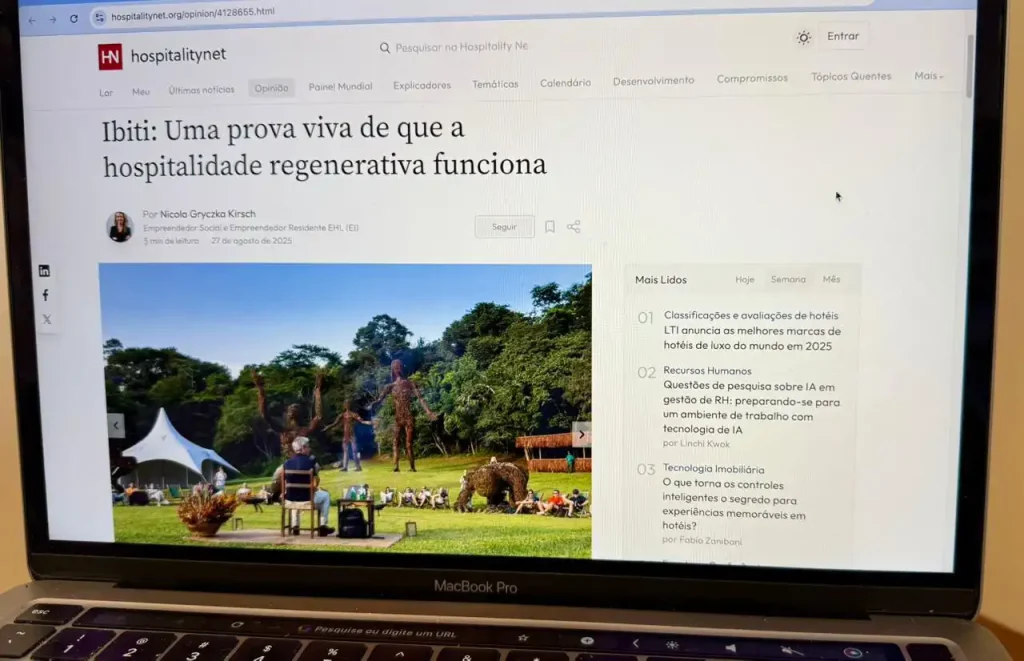
Ibiti Projeto is featured on Hospitality Net as a global reference in regenerative hospitality, uniting rewilding, community and innovation.
SP-Ibiti air bridge: Nature closer to you!

Getting to Ibiti has never been so easy - and so enchanting. Now, a regular SP-Ibiti flight connects São Paulo to Ibiti Projeto in just 1h20, shortening distances and bringing guests closer to one of Brazil's most unique experiences. Thanks to an unprecedented partnership with Flapper, a benchmark in executive aviation, weekends have a new possibility: take off from Campo de Marte on Friday afternoon and, a few hours later, be immersed in the trails, waterfalls and flavors that make Ibiti Projeto a unique destination in the world. "More than just shortening distances, this project represents a milestone in the consolidation of Ibiti as a benchmark destination for sustainable hospitality, regeneration and culture. We want access to be as special as the experience that awaits each guest here," says Hugo Cambraia, Ibiti's CEO. Comfort in the air, freedom on the ground The route is operated in a Caravan Grand, a safe and comfortable aircraft for up to nine passengers, with ample luggage for bicycles, musical instruments or suitcases for those who come to experience intense days of nature and well-being. "The Ibit Project is ready to position itself as one of the favorite destinations for weekend getaways for the public in São Paulo, Rio de Janeiro and Belo Horizonte," says Paul Malicki, CEO of Flapper. "We chose the Caravan Grand because of its safety and luggage capacity, replicating our model of shared flights already consolidated on other routes." In addition, Ibiti Projeto guests who choose to stay from Sunday to Thursday can enjoy special rates on repositioning routes, starting at R$ 750 per leg. Exclusive experiences With the air bridge on the same weekend, it is possible to: - Enjoy a candlelit dinner- Attend piano concerts- Cycle along the more than 300 km of trails- Enjoy therapies and spas- Watch the sky, the sun, the moon and the stars- Dive into crystal-clear waterfalls All this in a conservation and regeneration territory of around six thousand hectares, which unites nature, art, philosophy and Minas Gerais hospitality. The runway that was born of a dream Recently renovated, the Carolina de Assis Aerodrome (SJXM) now has an asphalt sidewalk, an expanded patio and operations compatible with executive aircraft such as the Caravan, King Air and Pilatus. Located at an altitude of 1,100 meters, the runway is 860 meters long and 15 meters wide, with an 8º incline and a patio with capacity for up to 4 aircraft. The dream of the runway was born with Carlinhos Repetto, founder of Ibiti Projeto, inspired by mountain airports such as Courchevel. In challenging terrain, in the first decade of the 2000s he made it possible to build it in a clearing in the middle of the forest, without having to cut down a single tree. The airfield was named after his mother, Carolina de Assis Repetto (1920-2025). The first woman to earn her aviator's license in Minas Gerais in 1939, Dona Lilina, as she was known, defied the standards of the time with boldness and courage. She flew aerobatics in her PP-GAN airplane, represented Minas Gerais in competitions and also stood out as a self-taught architect and the matriarch of a large family. Carolina passed away in February 2025, at the age of 104. Celebration The official inauguration, on September 18, brought together authorities, partners and friends of Ibiti Projeto, marking the beginning of a new stage for sustainable tourism in Ibiti Projeto. Fighting fires The airstrip not only shortens the distance between São Paulo and Ibiti Projeto, but is also a strategic support point for fighting fires in the region. In 2021, during a fire in the park, the operation was only contained with the help of aircraft hired by Ibiti Projeto, which used the then grass airfield as a base. With the renovation and asphalting, the runway now offers an even safer and more efficient infrastructure to support emergency actions, as well as allowing guests to fly exclusively. Book your seat flyflapper.com Information and accommodation (32) 98449-2200 (32) 99984-7626 Find out more ibiti.com @ibitiprojeto @ibiti.village @ibitiengenho
Ibiti Vegan Summit 2025: activism, taste and purpose

From September 22 to 26, 2025, Ibiti Projeto will host the second edition of the Ibiti Vegan Summit, a meeting that brings together plant-based gastronomy, activism and experiences of connecting with nature. The program brings together renowned chefs, international thinkers and creatives who have been showing the world that veganism is not only an ethical choice, but also a lighter, more beautiful and transformative way of living. For five days, participants will immerse themselves in experiences that go far beyond the plate: workshops with world-renowned psychologist Dr. Melanie Joy, themed dinners by chefs such as Dani Rosa, Tiago Feitosa, Luiza Maffort, Pri Herrera, Tati Lund and Thiago Medeiros, as well as panels on branding, sustainable fashion, lifestyle and the new paths of activism. Hiking trails, waterfall dives, stargazing and wellness practices complete the experience. "The idea is to show that activism can be light, beautiful and collective. Veganism doesn't have to be seen only as renunciation or sacrifice, but as celebration, exchange and inspiration. Ibiti, with its regenerative energy, is the perfect setting for this experience." Alex Soderberg, co-founder of Naveia and organizer of the event In the vegan calendar Ibiti Vegan reinforces Ibiti's mission to connect people, ideas and sustainable practices in a territory that combines environmental regeneration, art, gastronomy and spirituality. Co-produced by Naveia and Comuniversidade, the 2025 Summit promises to become one of the most important meetings on the Brazilian vegan calendar, bringing together activists, creators and those passionate about a more conscious life. See the full program Ibiti Village - Lima Duarte, MG22 to 26 September 2025 Information and reservations: (32) 98449-2200 Find out more: @ibiti.village
Ibiti on TV: Brazil that moves and transforms
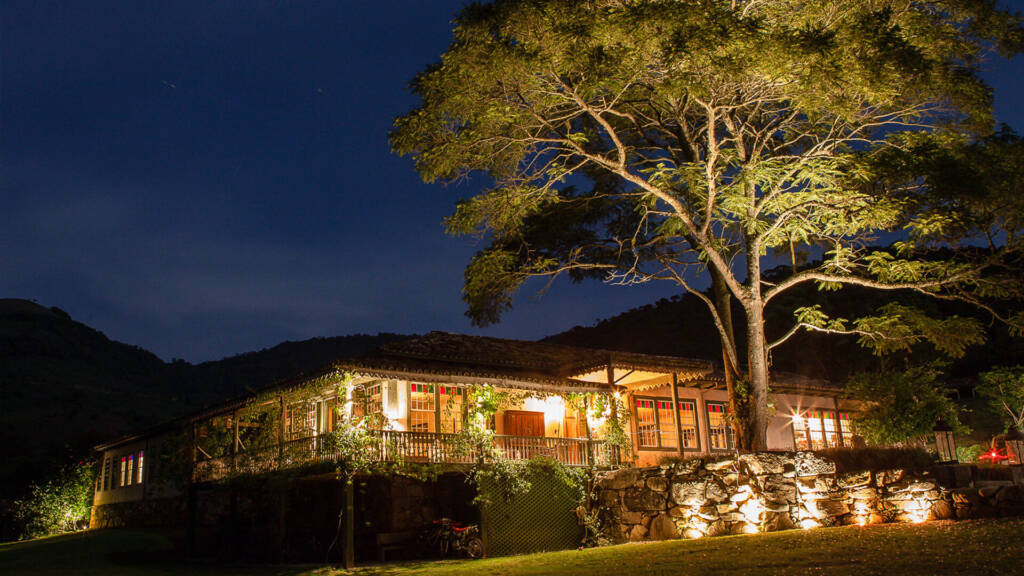
Álvaro Garnero reveals the charm of Ibiti Projeto in the first episode of Rede Record's "50 por 1" program
Bike track in Ibiti warms up the mood for Sertões MTB
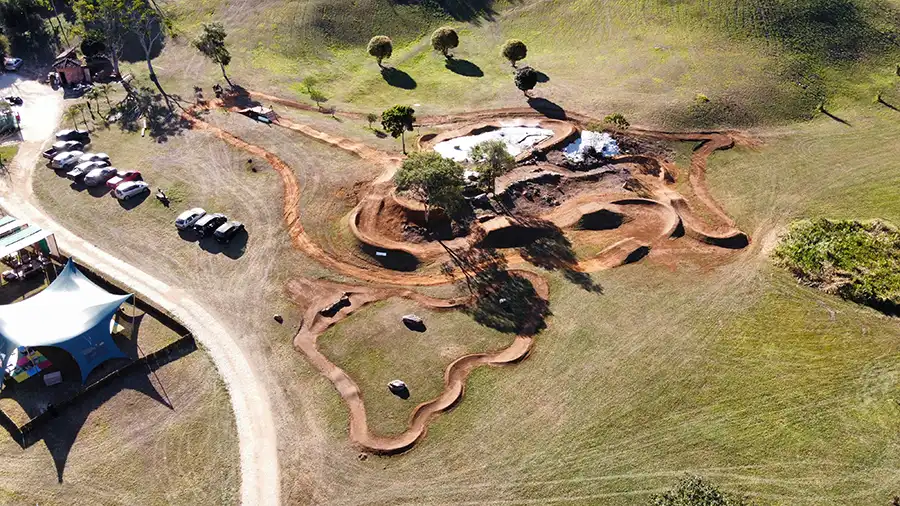
Ibiti has gained another space for those who love cycling: the new bike track, built at Engenho Lodge in partnership with Sense, promises to be a meeting point for cyclists of all ages. As well as promoting health and fun, the new circuit reinforces Ibiti's connection with sport and with reducing the carbon footprint, since the bicycle is one of the most sustainable means of transportation. "The track looks great and will really encourage sport, especially among children. Cycling is on the rise today, and initiatives like this encourage the community. This track can be used by anyone, on any type of bike, even electric bikes. It can be used for training, evolving movements, having fun and overcoming challenges. The most important thing is that it becomes an incentive for sport and fun, bringing more and more people to cycling," says Miguel Giovannini, mountain bike champion, entrepreneur of the Bike House in Ibiti Village and Ibiti Projeto bike guide. Named the Sense Bike Zone, the track brings together curves, ramps, descents, jumps and even a bridge, as well as making intelligent use of the natural elements of the terrain, such as rocks and trees. Nothing has been wasted: everything has been integrated into the course, reinforcing the connection between sport and nature. "The main aim is to enable children to overcome challenges and feel this connection with nature. In an increasingly technological world, structures like this offer unique experiences, capable of inspiring future athletes and sports enthusiasts," explains Daniel Teixeira Sales, Niel, a specialist in multi-sports tracks and responsible for the work. Sertoes MTB: from September 4 to 6 The novelty arrives in tune with Sertões MTB 2025, which will have Ibiti Projeto as its stage for the fourth consecutive year. After passing through Campos do Jordão (SP) and Nova Lima (MG), the third stage will define the season's champions in three days of challenging races, between September 4 and 6. In addition to the competition categories, the event will debut the Turismo Category, aimed at those who want to ride at a lighter pace, with E-Bikes, enjoying the trails and landscapes of Ibiti without the pressure of competition. It will take place on Saturday (6), with an estimated 30 km route, accompanied by guides and monitors. Limited places (registration here). "We're making cycling a national passion, and it's wonderful to have partners like Ibiti who believe in this purpose with us," celebrates Leonora Guedes, CEO of Sertões. Closing party with Wilson Sideral Another attraction will be the unprecedented awards party that closes the Sertões MTB Ibitipoca and the Sertões MTB Cup on Saturday night, after the winners of the stage and the champions of the season have been consecrated, with a concert by Wilson Sideral and his band. The general public will also be able to attend - tickets are now available via the link. As in the first two stages of the championship (Sertões MTB Mantiqueira and Sertões MTB Nova Lima), big names in mountain biking will also be in Ibitipoca. Among them, Albert Morgen, Sherman Trezza de Paiva, Hugo Prado Neto, João Paulo Firmino, Lukas Kaufmann, Márcio Ravelli, Miguel Giovannini and Luciano "Kdra" Lancellotti. In the women's race, Isabella Ribeiro and Roberta Kelly Stopa stood out. Find out more about Sertões MTB 2025
Muriqui Day: how preservation began in Ibiti

On August 27, we celebrate Ibiti Day and Muriqui Day, the largest primate in the Americas and a critically endangered species. For Ibiti, the date has a special meaning: it was here that Muriqui House was born, an unprecedented project to preserve the northern muriqui (Brachyteles hypoxanthus). It all started with the determination of Carlinhos Repetto, founder of Ibiti Projeto. Through reports from local residents, he knew that there were still muriquis living in Mata do Luna, an area threatened by deforestation. After a tireless search, Carlinhos managed to make the first photographic record of a northern muriqui in the region in 2002, confirming its occurrence. Listen to the audio Destiny transformed "I had been looking for this monkey for years," recalls Carlinhos. "This record was very important. It's on the back cover of the first book 'Reserva do Ibitipoca'. The photo of the monkey on the cover is by Araquém (Alcântara). When you open the book, there's a large black and white photo of the monkey, which was the first photographic record." At the time, Carlinhos found trees in full bloom with muricis, the monkeys' food, marked for felling. He went to the owner of the area and, with the support of his cousin Renato Machado, one of the creators of Ibiti, managed to buy Mata do Luna. This gesture was decisive: it guaranteed the preservation of the forest and started a conservation project that still resonates today. "It all started there," says Carlinhos. "I shouted to the world that it had to be preserved." And so the story of protecting the muriquis in Ibiti was born. Today, four decades on, the fight for the muriqui's survival continues. The Ibiti Project continues with regeneration and conservation actions, with unprecedented initiatives such as the Muriqui House project, developed in partnership with the Muriqui Biodiversity Institute - MIB. A historic step towards guaranteeing the future of the species. Celebrating Muriqui Day is above all celebrating the courage and vision of those who believed that preserving nature can transform destinies.
Ibiti: 43 years of inspiring dreams and possibilities
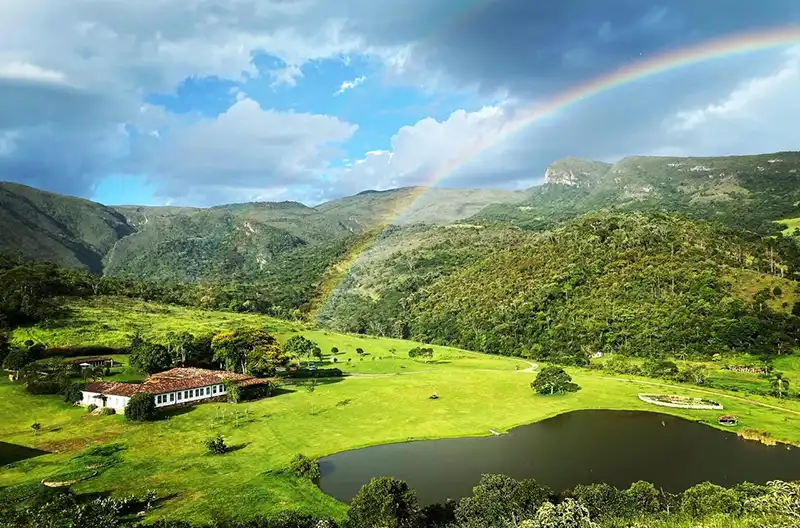
In 1982, Ibiti Projeto was born. That year, degraded land around the Ibitipoca State Park began to be bought up. Little by little, nature regained its place and the project transformed lives. Now, 43 years later, that dream has come true and is winning over people from all over the world. To celebrate Ibiti Day and Muriqui Day, both celebrated on August 27, we've put together excerpts from testimonies that capture the feelings of those who know this regenerating territory. We travel to belong, not to consume "I've just returned from a week-long immersion in Ibiti Projeto, in the heart of Minas Gerais, Brazil. Ibiti reminded me why we travel: to belong, not to consume. Mountains and springs. Farm-to-table. Laughter at long tables where locals and travelers exchange stories about life, nature and the meaning of things. A school that teaches purpose by living it day by day. Rewilding of 6,000 hectares. Endangered species reintroduced. An immersion in nature that heals and transforms. Art that empowers nature; and nature that empowers art. A model that shares ownership, so that the value remains with the people and the place. My reflections in three words: Flow. Abundance. Purpose. This is not hospitality as usual. It's regeneration in essence - and it works. I'm proud to support the Ibiti Project with Regenopolis: bringing the world to Ibiti, and Ibiti to the world." Ibiti is too good! To put it this way, the way we're used to in the region, Ibiti today has become a special corner of Minas Gerais, close to the Ibitipoca Park. There are 6,000 hectares! That's enough for four Ibitipoca Parks or more than 8,000 soccer pitches! And there are lots of animals here again: muriqui, jacutinga. We really look after nature and also grow over 100 types of food, all organic! It also gives local people the chance to work, learn and sell their products. It's the land of Seu Nilo, who saw the village resurface; of Janice and Gabriel, who chose to raise their family in the community; and of foreign visitors who take this little piece of Brazil into their hearts. There's specialty coffee, sweet strawberries, sunflowers, lavender, philosophy and spirituality. There are trails, waterfalls, a lake, good food, art and lots of nice places to stay: houses on the top of the hill, in the village and on the farm. Anyone who arrives can immediately feel the atmosphere: it's about taking a deep breath and renewing yourself, leaving lighter and happier. This is my life "This project has been a glory. Not just for me, but for other families who arrived, who needed it. Rafael, others... Because before, there was very little work here. Sometimes there was work, sometimes not. We'd walk 8 kilometers, 10 kilometers, in the rain, in the sun, to plant crops. There were no jobs, nothing. You have to be grateful. How many families are being supported by this project? Today I feel like I'm a different person. I talk to a lot of different people. This is therapy for me. This village, this project has practically become a family to me, because, come morning, I'm already inside. I have the privilege of not spending money on transportation to work, I can have coffee and lunch at home. There's nothing that can repay that."
Meet Muriqui Land: Ibiti's regenerative Land Rover
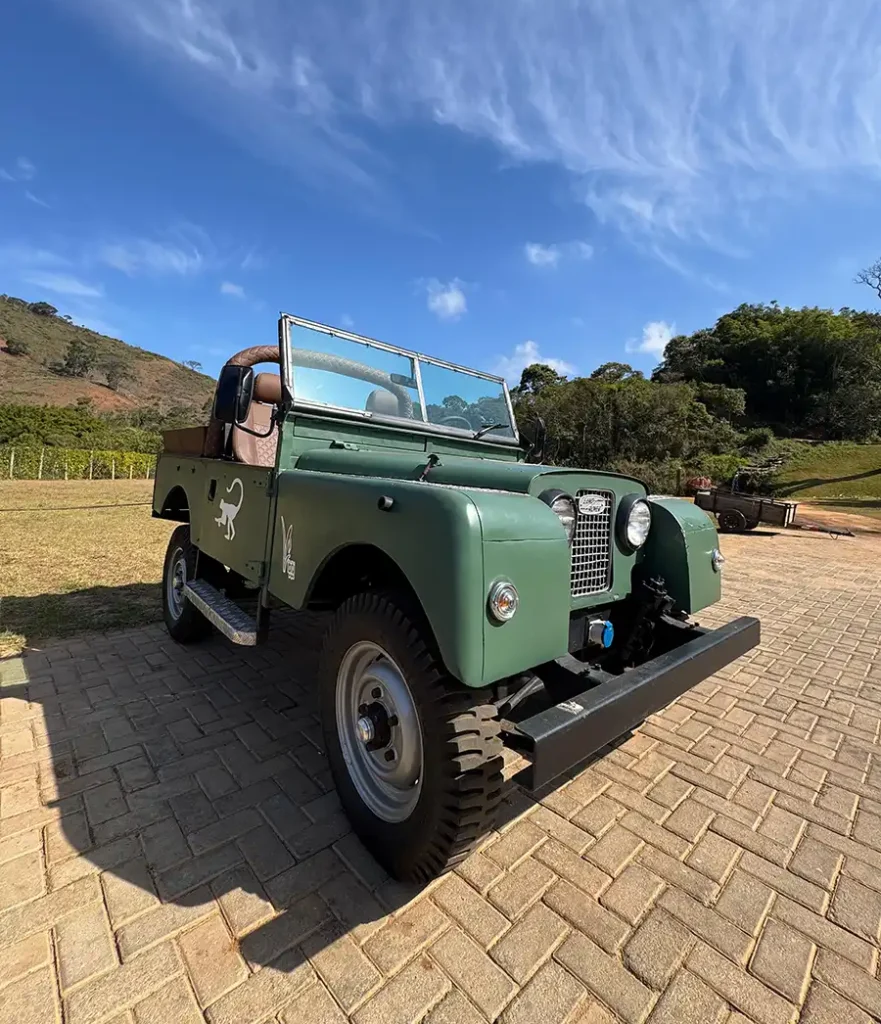
A classic from 1954, transformed into a symbol of innovation and regeneration. This is how the Muriqui Land was born, the Land Rover Series I fully electrified by Ibiti, which will make its public debut at the 24th Juiz de Fora Antique Automobile Meeting (August 28-31, UFJF Campus). The name is a play on words with Land, present in the brand and meaning 'earth' in English. Thus, the car was named Terra dos Muriquis, in honor of the largest primate in the Americas and a symbol of resistance and regeneration in Ibiti. "We seek innovation and disruption, but always with respect for our origins. Muriqui Land is an example of how we want to relate to nature in a sustainable and regenerative way," says Hugo Cambraia, CEO of Ibiti Projeto. Value in what remains The model is a reflection on how even a 70-year-old classic can be reborn with clean energy and, redesigned, be ready to last another hundred years. The forerunner of the modern Defender, the 1954 Land Rover Series I is a milestone in the British manufacturer's history. Inspired by the American Jeep and produced in aluminum due to the post-war shortage of steel, the vehicle stood out for its robustness and versatility. In 1954, the seven- and ten-seat station wagon versions arrived, consolidating its reputation for durability and reinforcing its status as a world icon. At Ibiti, this durability is celebrated as a fundamental principle. "By recycling this vehicle, we strengthen the idea that the old can be given a new lease of life, without discarding what is valuable," explains Hugo. That's the spirit: valuing the durable goods of the past and resisting the logic of programmed obsolescence and the rampant consumerism that turns everything into disposable. The classic Land Rover shares space with other relics that tell stories in Ibiti: an 1874 Steinway piano in rosewood, an attraction at the Gaia Café; and an airplane from the 1940s. Renato Machado, one of Ibiti's creators, points out that this philosophy is connected to a Japanese inspiration: the term Mottainai expresses deep respect for what is taken from the Earth and condemns waste. "In Japan, for example, some people restore a broken plate with gold, to show that, when recovered, it can be worth more than a whole one. The piano, the airplane, the Land Rover... these are icons that prove that humanity once knew how to produce things that lasted. Our role is to honor that tradition and show that we can do better." The challenge "It was a great challenge to electrify such an old Land Rover without losing its identity," says Hugo. The project was carefully coordinated by his grandfather, Maercio Alcântara, 81, who has more than six decades of experience in heavy machinery and mechanics. He accompanied every detail of the restoration at the invitation of Renato Machado, who bought the vehicle and entrusted his long-time partner with the mission of bringing this relic back to life. "I dismantled everything. I took out the engine, gearbox, transfer box... and reassembled it, now with the electric 'heart'. I kept the originality where I could, but brought modernity where it was needed," says Maercio, proud of the final result after around 120 days of work alongside the team from the Hidraumática workshop in Juiz de Fora (MG). Before After A classic that breathes future The Muriqui Land preserves the essence of a 1950s Land Rover - robust, versatile, charismatic - but with a regenerative soul. The original combustion engine has been replaced by an imported, silent, zero-emission electric powertrain. "We eliminated the central tunnel in the body, which previously housed the gearbox, and the floor became flat. This made room for another seat in the front. Today the car seats a total of nine people," explains Maercio. History in every detail Nothing escaped Maercio's careful craftsmanship. He even attended Land Rover events in search of references and even redesigned a special Land Rover logo for the steering wheel, a detail that reveals the level of personalization. Muriqui Land Technical File (Land Rover Series I, 1954)
Coexistence: Oca do Ibiti becomes a gallery with photo exhibitions and models
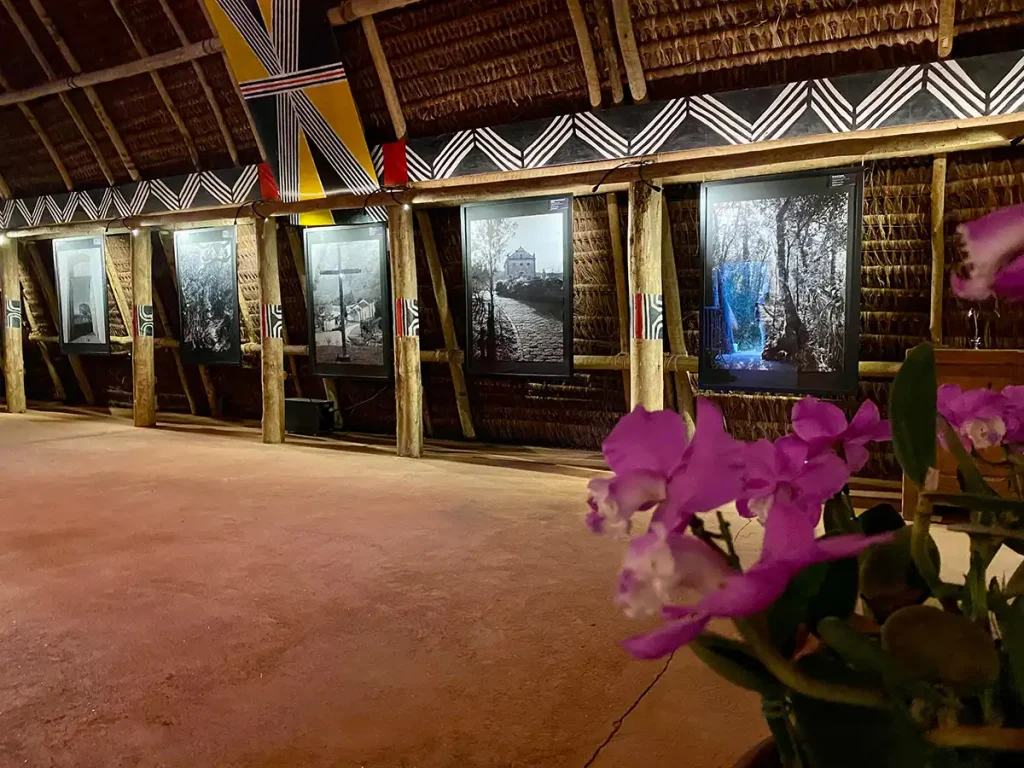
What commitments do we make to regenerating the world we live in? On display at the Oca do Ibiti for an indefinite period, the exhibition "Coexistence - Constructions, Cultivation and Regeneration" invites us to reflect on the connection between human beings and nature, showing how we can coexist with the world around us. Through the sensitive photographs of Marcio Brigatto and the handmade models of architect Luiz Antônio Saraiva Campos, or Tziu, the exhibition weaves a narrative about the interaction between human beings, their constructions and the regeneration of the natural world, in scenes of life in Vila Mogol and Ibiti Projeto. "The regeneration of nature also reflects human regeneration. The scenes captured by Marcio dialogue with the organic constructions of Ibiti, marked by simplicity and so well represented by Tziu's models. This encounter between the sophisticated and the ancestral, between the planned and the spontaneous, presents a rich and contrasting universe," says Heliane Machado, who wrote the show's text and worked on the conception of the exhibition alongside Regina Machado and Raquel Salgado, both from the Lagar Arquitetura office, responsible for the exhibition project. Exhibition celebrates harmony between architecture and nature At the opening, which took place on August 9, nature was represented by the beautiful bromeliads, orchids and other plants from Ibiti Orquídeas, owned by entrepreneur Guilherme Salgado, who runs the Ibiti nursery. The atmosphere of poetry, mining and many stories was completed with live music from the Olho d'água duo and the screening of the documentary "Lembranças do Mogol", which brings together testimonies from former residents. With the hard work and dedication of the Ibiti team, in a few weeks the Oca do Ibiti was transformed into a gallery, adding more content to the multifunctional space, which hosts events and accommodations for groups. Credits Service Oca do Ibiti, at the end of Vila MogolOn display indefinitelyAccess for Ibiti guests Project Find out more About the exhibition https://ibiti.com/coexistencia/ About the oca https://ibiti.com/oca-do-ibiti-tradicao-cultura-e-natureza-em-harmonia/ About models https://ibiti.com/arte-em-maquetes-sustentaveis/
Life School: A new way of learning in Ibiti
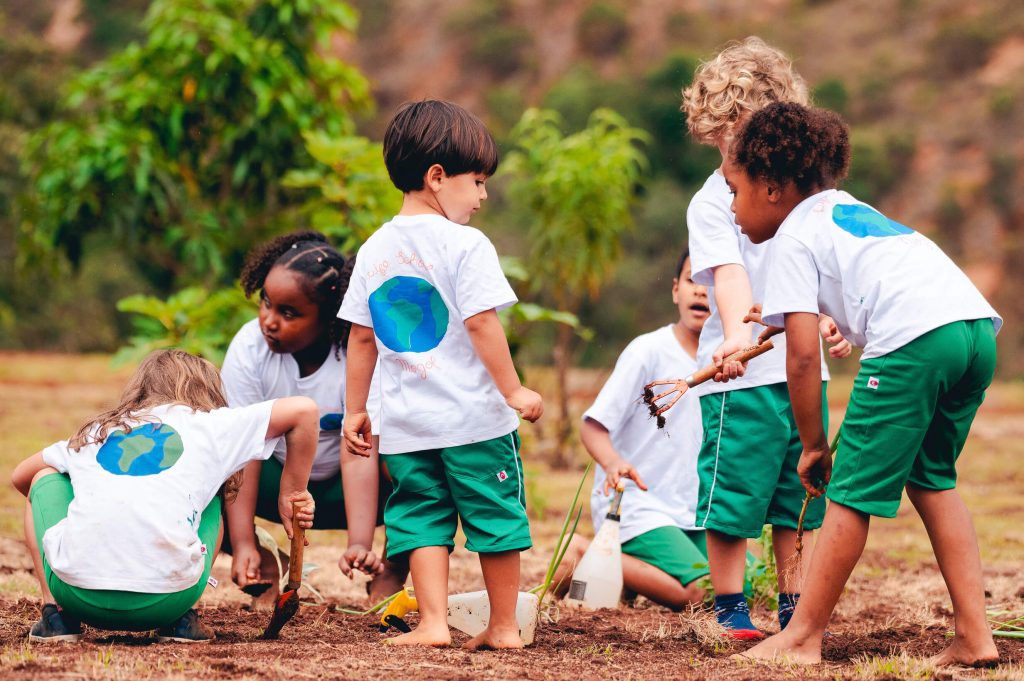
What if the classroom was the forest? At Life School, math can be learned by watching muriquis. Science, by planting trees. And stories, inside an indigenous oca. This is the children's routine at the multilingual, rural school in Ibiti Village, Vila Mogol, where nature is the main textbook and freedom the greatest lesson. Recognized by the MEC, the Life School is a branch of the Centro Educacional Fundação Guairá, in Andrelândia (MG), and offers two multigrade classes, for children aged 3 to 5 and 6 to 10. Open to the global community, it also welcomes children from families staying temporarily at Ibiti, creating an atmosphere of exchange, diversity and hospitality. "We believe that learning is living. That's why we take down the school walls and integrate everyday life into the teaching process," says Lane Machado, director of Life School. Nature as a classroom Here, every natural phenomenon becomes a starting point for learning. The muriquis, for example, inspire interdisciplinary projects involving biology, botany, geography, literature and mathematics. Thus, the contents of the Common National Curriculum Base (BNCC) are approached by the teachers through projects and real experiences, always with play as the guiding thread. In addition, the students have contact with inspirational people: Ibiti professionals who share their diverse knowledge, from gastronomy to the arts, from permaculture to organic cooking. "It takes a whole village to educate a child": this is the maxim that guides the inspirers' project. Non-profit education with a social impact Although it operates as a private school, Life School is a non-profit initiative. This means that all surplus funds are reinvested to provide scholarships for children from the Vila Mogol community and the children of Ibiti Projeto employees. It is an open, diverse and inclusive school, which believes that a transformative education must be accessible and connected to the territory in which it is located. To guarantee its economic sustainability, Life School has an "Adopt a Student" program, through which any person or company can directly support the continuity of the project and increase its social impact. Find out more: @ibiti.lifeschool
How the Statues got to Ibiti
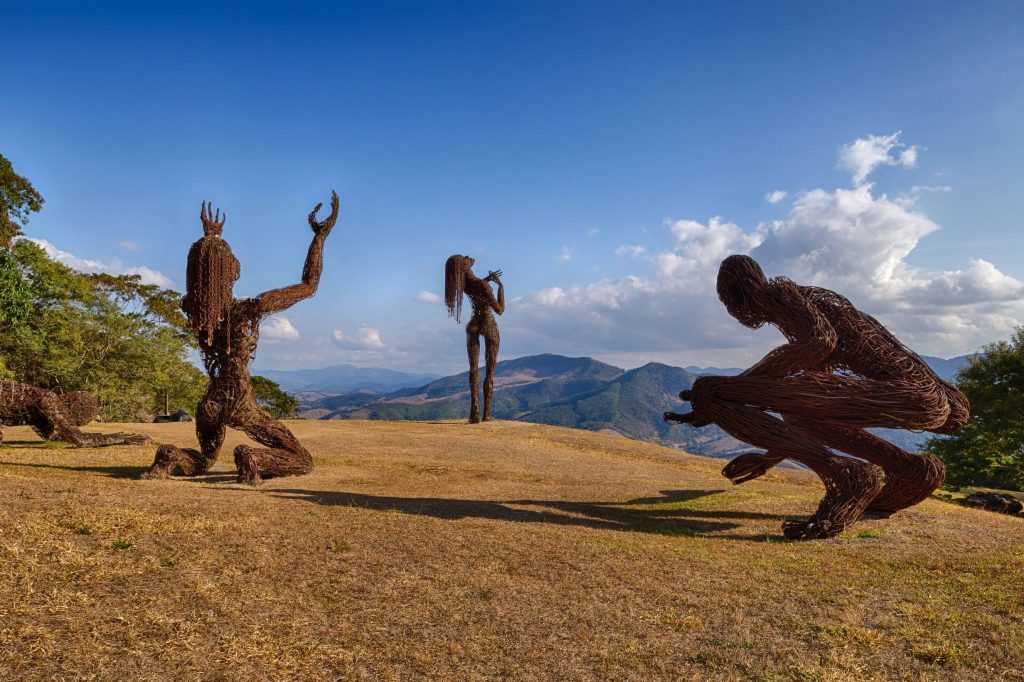
"I never imagined, not even in my wildest dreams, that they would come to a place like this. I'm very happy to be here with them," says artist Karen Cusolito on her most recent visit to her work, in 2022, at Pedra do Tatu, where her Big Family, known simply as the Statues, "live". This record can be seen in "My Big Family - Revisited", an 18-minute mini doc available on Ibiti Projeto's YouTube channel. Crossing oceans In between Karen's speeches, the film, directed by Mauro Pianta, also shows how the Statues made their way from California (USA) to Ibitipoca (MG) in 2014. The images were taken by Felipe Scaldini, director of another film, "Migration", which documents this journey in detail, also available on the Ibiti Projeto YouTube channel. Transportation from the Pacific to the Atlantic was no easy task, as Renato Machado recalls. Founder of Ibiti, he found out about the work when he was passing a shed: "I had suggested cutting the sculptures and then casting them here, with a specialized and reliable team. But then Karen said to me: 'Renato, you're not going to cut up my children, are you?' And she herself helped to make some 'beds' to lay the statues on, which came on the ship in one piece. To get them up to the top of the mountain, we had to open a road for the tractor to pull up with the crane, and then we closed it and planted them on top." A destination Karen made a point of getting to know the place where the Big Family would be moving. "I wanted it to be a destination, not an obvious place like next to the Pousada do Engenho. So I suggested three places, hoping for this one, which she also liked. Then she did three layouts and asked me to choose one, and again we agreed," says Renato. For him, the work took on a new meaning when it came to Minas. "It's an artwork very much in line with our project, because it's recycling, it's garbage that has been transformed into something better, a 'regeneration'. And it's certainly art made with steel that left Minas Gerais, had its use on the planet and came back here, because our state is a major supplier of ore to the world." Feeling translated Karen Cusolito took around three years to complete the work and presented it in 2007 at the Burning Man Festival in the United States. At its center was an oil derrick, representing the god of today. "The intention was to show our ambition for oil and how it impacts on the economy and environment of almost every culture around the world." Karen made art installations in Boston until she moved to San Francisco in 1996. There, she runs American Steel Studios, a huge warehouse in the suburb of Oakland, where more than 200 artists and creative entrepreneurs work. It was there that, over the course of a few years, she created the set of sculptures. About the strong presence of the human body in her sculptures, the artist comments: "The human form is a rich arena for exploring and expressing emotion, intention and challenge". Most of her work focuses on humanity and the environment and "the delicate balance between the two". Get to know the meaning of each sculpture ACHMED Represents the Muslim part of the world. It connects to the Earth with humility and devotion MUMBATU Slender and strong, it refers to African traditions. By sowing, it suggests the partnership between human beings and nature ECSTASY It seems to be in movement and, according to Karen, is "something of a hippie, sun worshipper, in joy with nature" EPIPHANY In a moment of enlightenment, it represents clarity, joy, the appreciation of life PASSAGE It shows creativity and tradition being passed down from one generation to the next: mother and child walk together HUMBLE GEORGE The knight, in a posture of acceptance, reflects calm, the Christian faith
Café Gaia: the regenerative taste straight from Ibiti
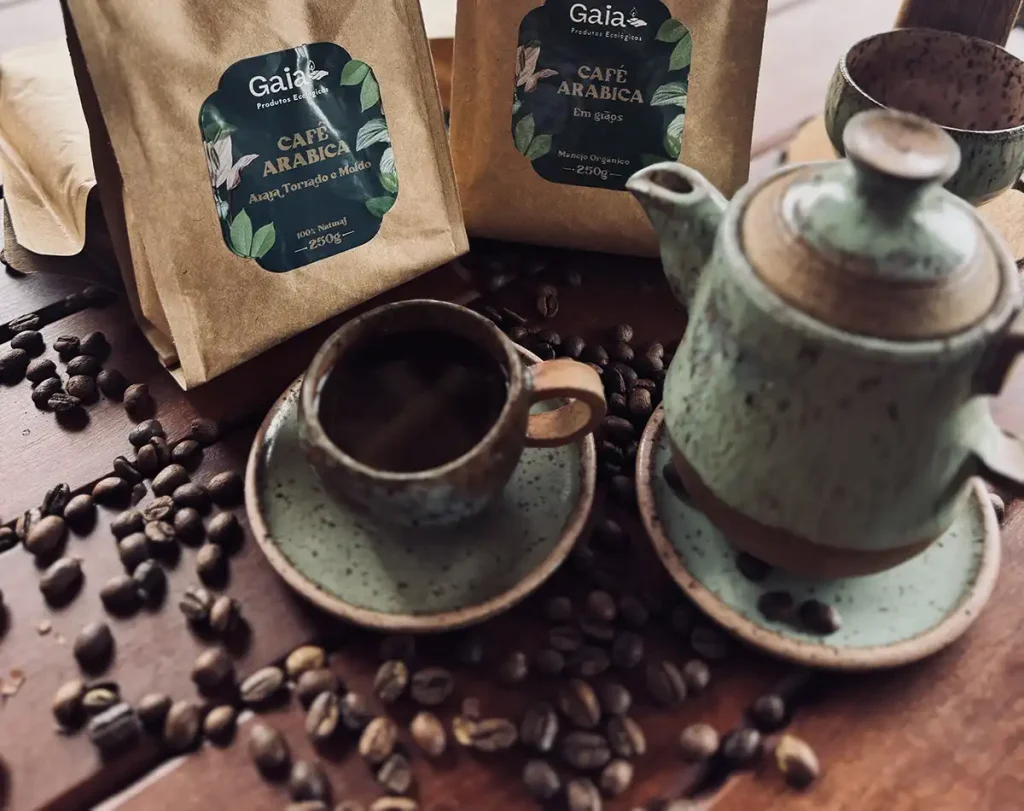
Anyone who has a cup of coffee at Ibiti Village isn't just enjoying a drink. They are savoring a story of caring for the soil, respecting biodiversity and valuing artisanal work. Produced by Gaia Produtos Ecológicos, Café Gaia is an example of regenerative coffee. Grown organically, it represents the meeting of excellence and sustainability. Local production: from bean to cup Café Gaia is produced on Ibiti's land, in an area of transition between the Atlantic Forest, Cerrado and Rupestrian Fields. There, agronomists Gabriel Barbosa and Janice Ventorim, masters in organic farming, conduct each stage with technical rigor and passion. From planting to the final roasting, everything is done with attention to the environment and the quality of the grain. "Harvesting is done by hand, only with ripe fruit, and the coffee is dried on a covered patio before going through the monjolo and controlled roasting. It's a natural and artisanal 100% process," explains Gabriel. Two varieties of Arabica coffee are grown: Arara (already in production) and Geisha (planted in 2025, with the first harvest scheduled for 2029). The climate, altitude and environmental protection contribute to Café Gaia's unique sensory profile - balanced, aromatic and full of personality. Respect for the soil, biodiversity and taste For Janice, in addition to organic management, Café Gaia's biggest difference is the fact that it is grown in Ibiti. "It's not just any coffee. It's grown in the Ibitipoca region at an ideal altitude for Arabica coffee and protected by an area with 96% of regenerating native vegetation. This has numerous benefits for the final quality of the coffee." According to the agronomist, taking care of the environment in which it is produced is one of the reasons why organic farming is easier. "The native vegetation favors biodiversity and the presence of natural enemies that fight any pests. That's what sets us apart." A warm break in winter: cappuccino with Café Gaia To celebrate Sustainable Gastronomy Day (June 18), established by the UN, and to warm up the cold days in the mountains, the Gaia Café team has prepared a special cappuccino recipe with Café Gaia, ideal for enjoying winter with flavor and environmental awareness. Cappuccino recipe Ingredients: Directions: Sustainable gastronomy starts with conscious choices Café Gaia is an invitation to rethink the way we eat and relate to nature. By choosing an organic, local and regenerative coffee, you support sustainable agricultural practices, strengthen communities and contribute to a more balanced future. Find out more: @ibiti_gaia @ibitiprojeto Ibiti.com
Ibiti Travessia: Six days of e-bike, nature and inner reconnection
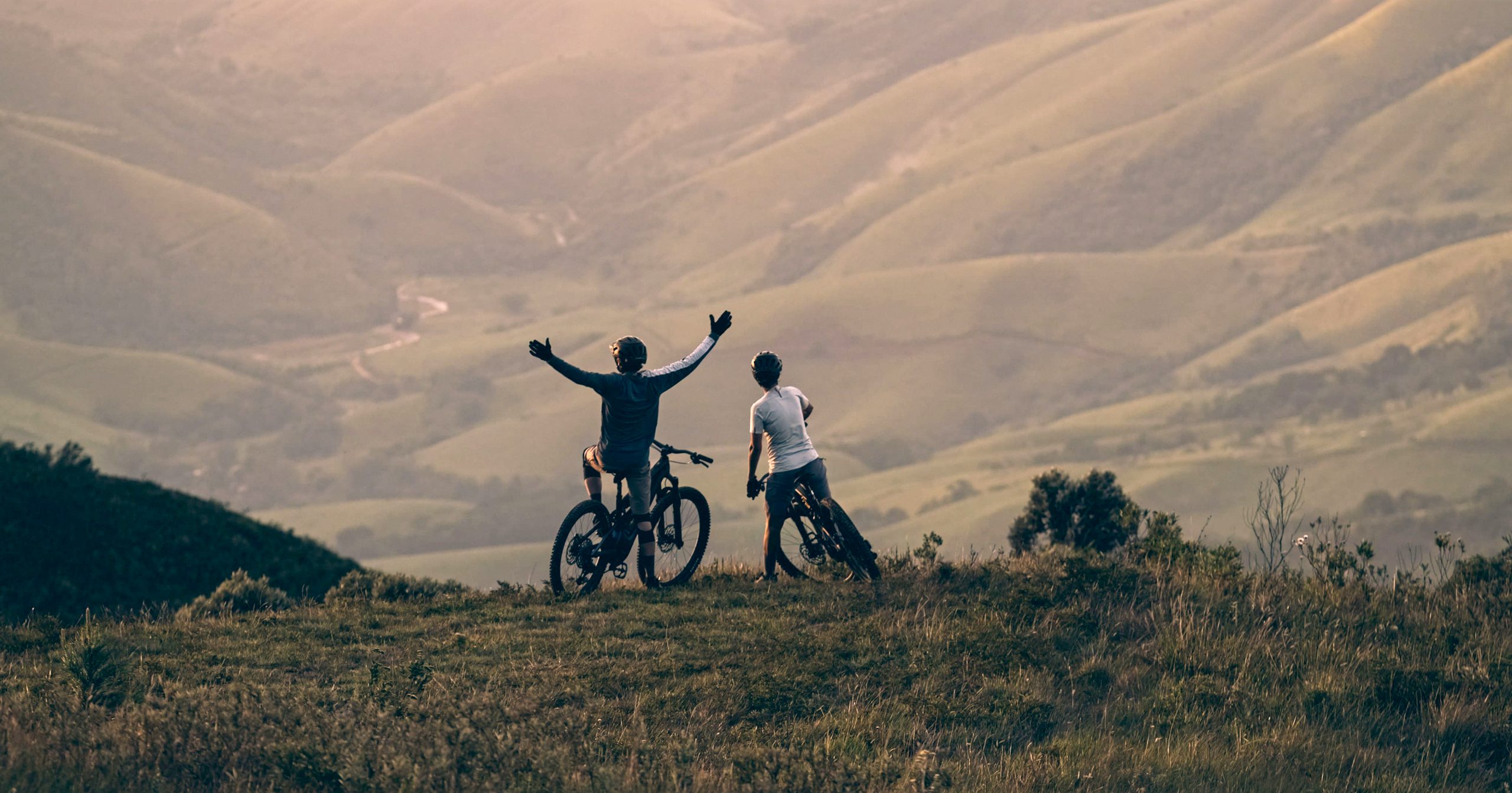
It's in the middle of the road that life happens. When your feet feel tired and your soul begins to expand. Ibiti Travessia is not just an electric bike ride. It's a plunge into the immensity of time, nature and self-knowledge. Six days and five nights of adventure, contemplation and passage. As with the great routes of humanity - from the Camino de Santiago to the trails of the Andes - here too you cross more than a landscape: you cross inwards. A journey in three stages With a total length of approximately 100km, the Ibiti Travessia takes travelers through three different forms of hospitality, connecting them to different rhythms. It begins at Engenho Lodge, where sophistication meets the memory of an ancient time. There, on the farm that has become a refuge, comfort is an invitation to rest and adventure. The Raízes Spa, the trails through the Statues, the Water Circuit and the climb to Isgoné - Ibiti's highest point - prepare body and spirit for what's to come. On the third day, the road beckons. On two wheels, travelers set off for Areião, where simplicity imposes itself like an unexpected luxury. It's 25 km between waterfalls, mountains and the historic Boa Vista Farm, with a stop at the Asas project, dedicated to rescuing wild animals. At Areião, time slows down. The late afternoon light gilds the quartzite sands, and silence becomes a dwelling place. Here, everything is reduced to what is essential - and, because of this, everything expands. The last destination on the journey is Ibiti Village, where the spirit of the Mogol village pulses. Two days of a different kind of immersion: the simplicity of a village, life taking its course without haste. The Waterfalls Circuit, the bike trails, the Chapadão viewpoint. At the Yucca restaurant and Gaia Café, the cuisine reflects the care and respect for the earth's ingredients. On the sixth day, a final dip in the calm waters of Lago Negro, a visit to Muriqui House - a project to preserve the northern muriquis - and the certainty that every step taken in Ibiti was also a step inwards. Beyond the trails: the essence of Ibiti Travessia Bruno Reis, a guide in Ibiti for five years, grew up in the midst of these trails and never tires of walking them. "Each crossing is different, because each person arrives here with a story. And everyone leaves with something new." Among the points that most impress travelers, he mentions the Big Family - seven giant sculptures made from scrap metal by artist Karen Cusolito. "There are more than 40 tons of iron and steel at the top of Pedra do Tatu. The 4km hike up there is already worth it, but when you arrive and see those giant statues looking down at you... it's a remarkable experience." And it's not even the "toughest" trail, according to Bruno. Of all the hikes, the one that leads to Isgoné, Ibiti's highest point, is the one that demands the most from tourists. "It's about 7.5km uphill, and then another 7.5km downhill, passing the Statues and the Water Circuit, where people enjoy the waterfalls," he says. But the physical demands don't scare those who face the adventures inside Ibiti, Bruno guarantees. "Those who do it really enjoy it and usually come back." "The idea is to combine the useful with the pleasant: the comfort of Ibiti's hospitality and outdoor activities. All of this in constant connection with nature," says entrepreneur Claudia Baumgratz, Travessia's creator and a born adventurer. "Travessia is an opportunity to experience each of these three lodging concepts, their respective accommodations and different styles of cuisine, as well as the main attractions throughout Ibiti. More than a tourist experience, the Travessia is an invitation to get lost and find yourself in the middle of the road. To leave behind what weighs you down and take only the essentials with you. What the Ibiti Travessia includes Ibiti Travessia day by day Book: (32) 98449-2200 - (32) 99984-7626 Find out more: Ibiti.com
Ibiti in Forbes as a destination of "sustainable exclusivity"
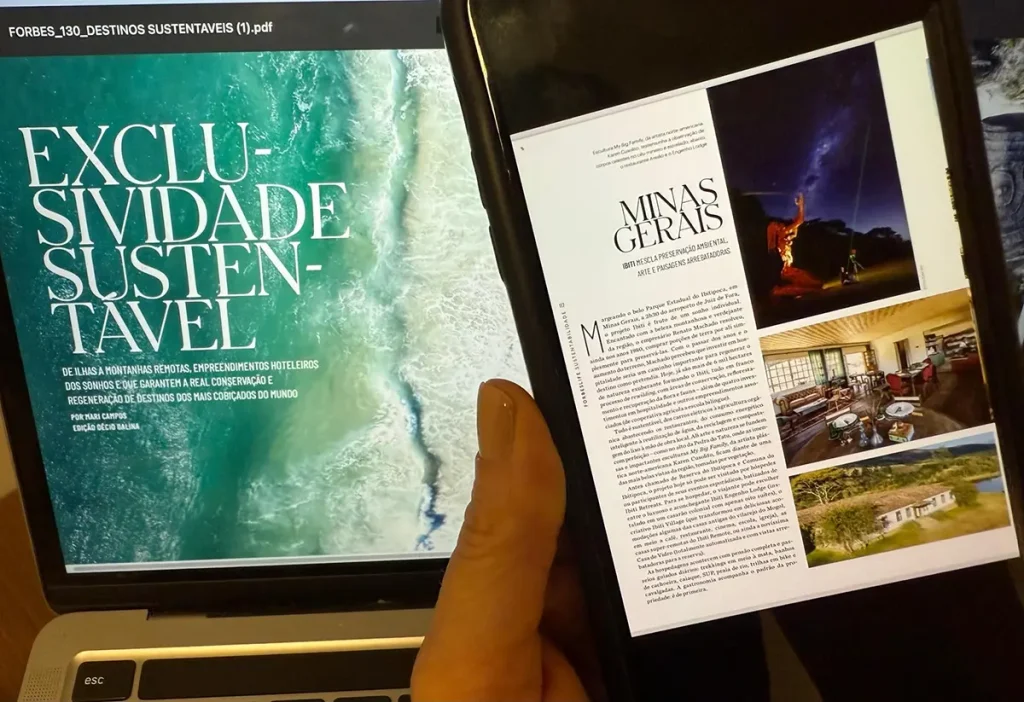
Ibiti has been included by Forbes Brazil magazine as one of the top six sustainable and exclusive destinations on the planet.
Ibiti Retreats: When leaders reconnect with nature
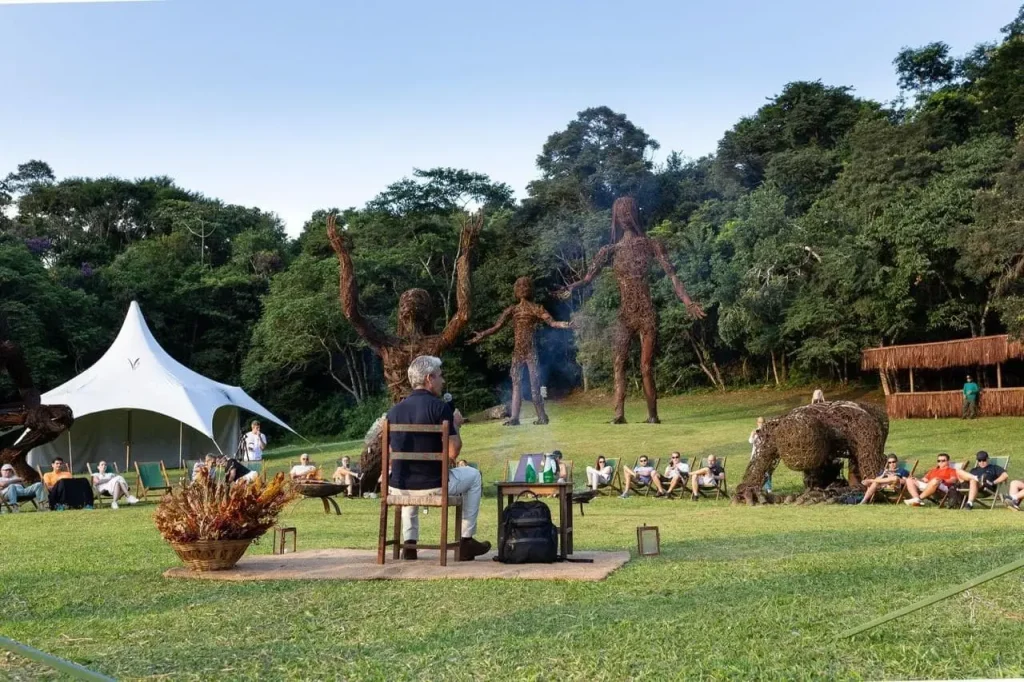
What can change when leaders and teams get away from the routine and immerse themselves for a few days in a territory of living, regenerated nature? Ibiti Retreats shows that the simple act of slowing down can be the key to a new way of leading, living together and innovating. More than a corporate retreat, Ibiti Retreats proposes a deep reconnection - with the earth, with the body and with the collective purpose. The experiences are tailor-made for business groups that want to transform their organizational culture from the inside out, in tune with the urgencies of our time: well-being, sustainability and meaning. "Nature is a powerful ally in the development of more conscious and healthy leaders. Our aim is to provide in-depth experiences that help regenerate not only the relationship with the environment, but also with work, with others and with oneself," explains Maíra Delgado, who is responsible for the retreats at Ibiti and for Comuniversidade, one of Ibiti's enterprises focused on events, courses and training. A new way of learning, integrating and regenerating Inspired by the principles of regeneration, the program is structured around four pillars that can be combined according to the objectives of each group. Each retreat is designed in a personalized way, combining regenerative practices with human development strategies and organizational culture. The programmes are organized around four pillars: 1. Regeneration of the Earth - ESG in practice Experiences in sustainability, belonging and connection with the territory: 2. Regeneration of the Self - Well-being and high performance Moments of care and deep listening to the body and mind: 3. Regeneration of Knowledge - Learning and innovation Exchange of ideas, experiences and knowledge: 4. Corporate Immersion - Strategic alignment and leadership Tools for building a more collaborative, creative and healthy environment: Retreat as reunion Ibiti Retreats does not offer ready-made formulas, but fertile spaces where each group can cultivate its own discoveries. The food is plant-based, harvested on the territory itself. The architecture is designed for silence and contemplation. And time here runs to the rhythm of nature - with softness, presence and depth. Because leading the challenges of the present requires more than efficiency: it requires sensitivity, vision and the courage to change. And sometimes it all starts with a pause in the right place. "Coordinating the Ibiti Vegan event is a huge privilege! Ibiti Projeto is such a magical place that it lets us dream of a possible utopia in which veganism plays a fundamental role. The connection with nature and the energy of the place create the ideal environment to engage international leaders of the vegan movement in this annual gathering and generate real impact." - Alex Soderberg, co-founder of Naveia "Holding the immersion of our integral health course - Rise to Shine, from NOS Escola, in Ibiti is always very enriching. Ibiti is a living example of our philosophy. The values, the socio-environmental projects, the energy of the place, nature, the genuine connection between people... everything there enhances learning, making each edition even more special." - Anna Elisa Castro, chef, health coach and founder of NOS Escola An invitation to transformation The Ibiti Retreats experiences are open to companies from different sectors and of different sizes. The programs vary in length and take place in Ibiti - a territory that borders the Ibitipoca State Park and combines environmental regeneration, social innovation and hospitality. Ibiti Retreats Regenerative experiences for leaders, teams and organizations. Schedule a chat with the curatorial team, contact us. 32 99108-7162 Learn more Corporate Events
News from the mountains: Read the Ibiti Journal - Fall | Winter 2025
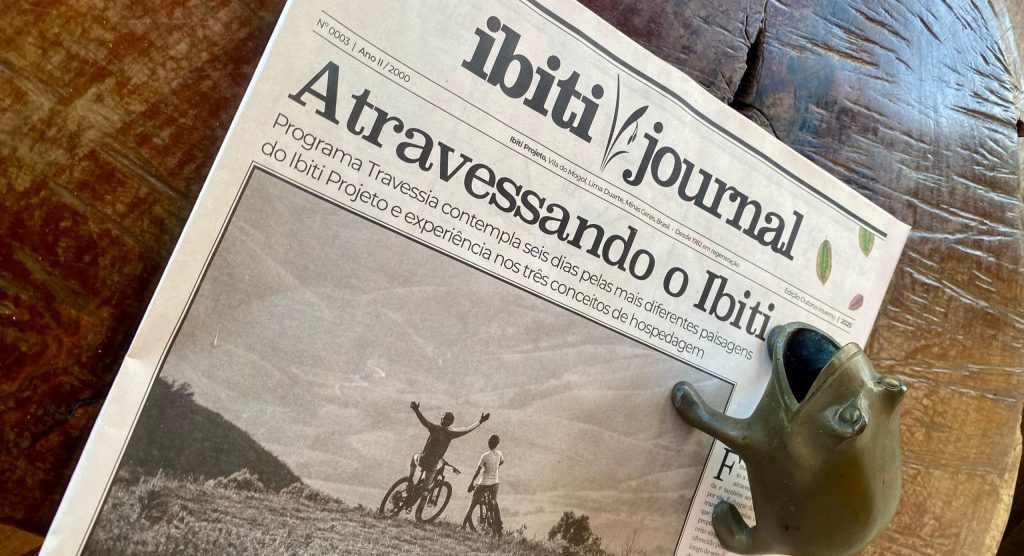
The third edition of Ibiti Journal comes with inspiring stories and content that connects nature, regeneration and culture. Produced in black and white and printed in standard format, Ibiti Journal values the essential and invites you to recover the habit of reading a newspaper calmly. In times of visual overload, we have invested in clarity, the written word and the power of stories that connect. The proposal is to transmit content without excess - but always with depth and inspiration. The cover story, the Travessia program, is an invitation to explore paths, overcome challenges and immerse yourself in the essence of Ibiti. See the highlights of this issue: Travessia - A journey that transformsThe main story presents Travessia, an immersive experience that covers around 100km of trails through Ibiti Projeto. For six days, visitors experience three different accommodation concepts and cross landscapes of forest, lakes and waterfalls, on a journey that transforms both body and soul. The regenerative taste of Café GaiaMeet the 100% Arabica coffee grown with respect for the soil and biodiversity, an experience that goes beyond the palate. Regenerative tourism on the agendaClaudia Baumgratz, from Engenho Lodge, shares her vision of the challenges and purposes of tourism that not only preserves, but regenerates. Deep rootsSeu Nilo presents the jequitibá he planted in the village, a symbol of the longevity Ibiti seeks to build. Biodiversity and rewildingMeet Bambu, the tapir cub that enchants visitors, and understand the impact of rewilding on Ibiti's ecosystem, in an exclusive article by UFV professor Fabiano R. Melo. Zero Waste: an invitation to reflectRethinking habits and reducing waste is one of the challenges of our time. How can we consume and dispose of waste more consciously? Flavors of IbitiLucinha, who takes over the kitchen on the night shift at Engenho Lodge, shares the recipe for the classic broinha de angu, a delicacy at afternoon coffee in Minas Gerais. Stories, curiosities and inspirationDiscover the origin of the name Mogol, learn the secrets of Areião and check out a special selection of books and films that relate to the Ibiti lifestyle. The digital version of Ibiti Journal | Autumn-Winter 2025 is now available to read and has links to other information. Ibiti Journal Fall | Winter 2025 - Portuguese Ibiti Journal Fall | Winter 2025 - English Happy reading! Read also: First edition - Ibiti Journal Fall/Winter 2024 - Portuguese Second edition - Ibiti Journal Spring/Summer 2024 - Portuguese and English
Ibiti Day: Program opens the doors of Ibiti to surrounding schools
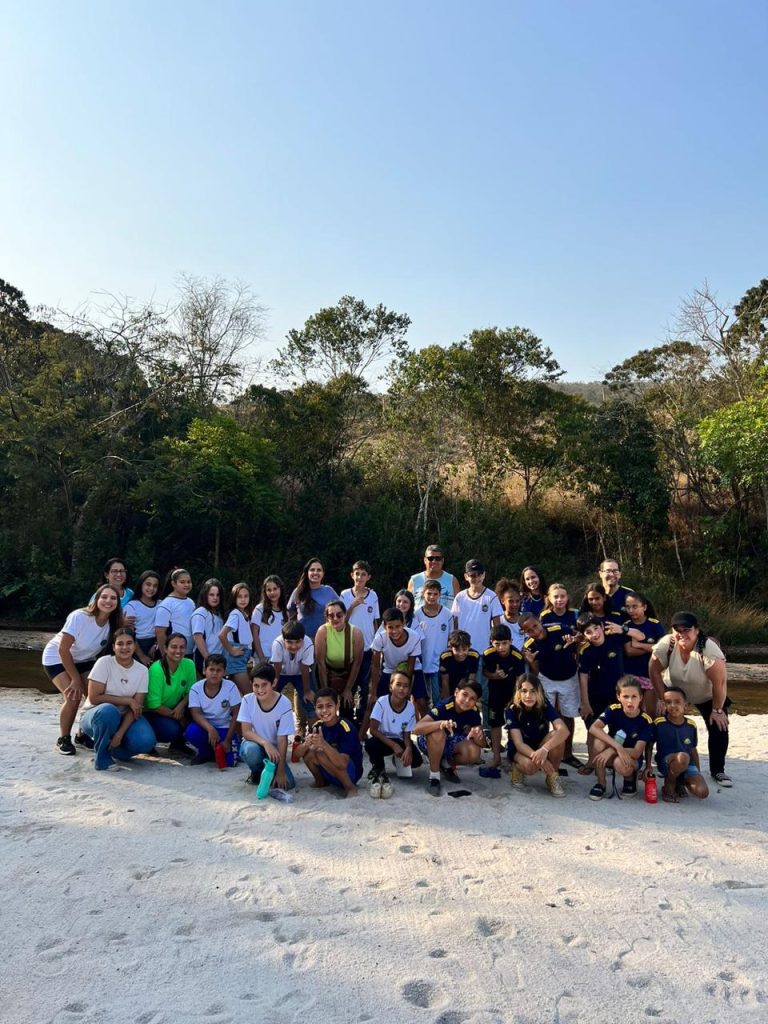
Learning through a day of discovery in the nature surrounding Ibiti Projeto and its socio-environmental initiatives. This is what Ibiti Day is all about - a day of immersion with activities specially designed for 5th grade classes from public schools and groups from institutions such as APAEs, nursing homes and hostels. More than just a visit, Ibiti Day is a bridge between the project and neighboring municipalities such as Lima Duarte, Olaria, Pedro Teixeira, Santa Rita do Ibitipoca and Bias Fortes. By welcoming students and educators to the village of Mogol, Ibiti reinforces its commitment to inclusion, environmental education and the appreciation of local cultures. In March, this experience was enjoyed by a group from the APAE Day Center in Lima Duarte. "It was a unique moment for them. They loved everything, everything! They had never taken part in anything like this before, so it was very enriching. They came back excited, telling us everything they'd experienced, showing us what they'd done with their handicrafts and wanting to know when they'd be able to come back. It was really special." Rafaela Soares Neves, a social worker who accompanied the visit Ibiti Day Programming All of this in a safe, welcoming and inspiring environment that awakens curiosity, environmental awareness and enchantment with the natural world. Strengthening ties with the region Since its inception, Ibiti has sought to work in partnership with the surrounding community. Ibiti Day is a living reflection of this purpose, offering more than a walk: it's an opportunity for new perspectives, belonging and citizen education. With each edition, new stories are built - and seeds of transformation are planted. Schools Selected - Ibiti Day 2025 The institutions selected to take part in the program between June and November 2025 have already been confirmed. 📋 Check out the full list here: School Municipality Class(es) Municipal School Francisco Augusto de Oliveira Lima Duarte 5th grade Municipal School Sebastião de Paula Pedro Teixeira 5th grade Coronel José de Salles Lima Duarte 5th grade A Municipal School Ataualpa Duque Olaria 5th grade Bias Fortes Lima Duarte 5th grade A and B Coronel José de Salles Municipal School Lima Duarte 5th grade A Escola Municipal Franklin Pereira do Nascimento Santa Rita do Ibitipoca 5th grade Escola Municipal Padre Carlos Lima Duarte 5th grade - Tia Calina Escola Municipal Padre Carlos Lima Duarte 5th grade Escola Municipal Paraíso Garcia Santa Rita do Ibitipoca 5th grade Escola Municipal Sebastião de Paula Pedro Teixeira 5th grade Pre-Escola Municipal Tiago Delgado Lima Duarte 5th grade A We would like to thank all the schools and institutions that signed up. We will contact you shortly to confirm the dates and send you the next steps for the visits. By inviting the surrounding community into Ibiti, Ibiti Day transforms the area into a living classroom. It's an opportunity to strengthen ties, exchange knowledge and inspire new generations to take care of what belongs to everyone: life, the earth, the future. Informaçõescnv@ibiti.com Watch the video on @ibtiprojeto
Mogol: Where does the name of the Minas Gerais town that won the world come from?
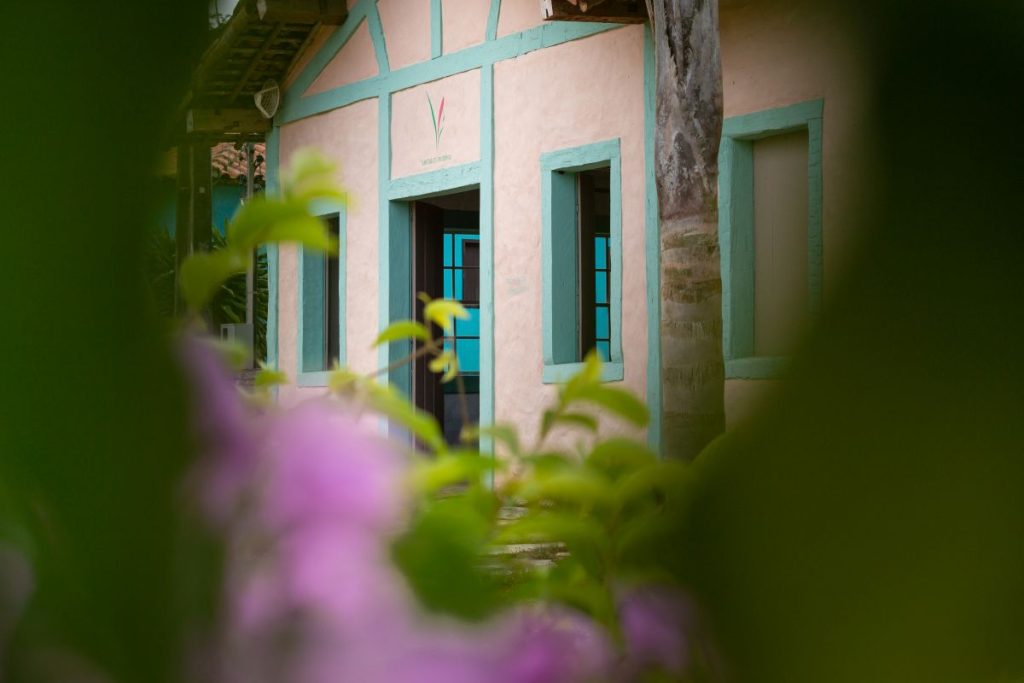
Everyone who hears about Vila Mogol immediately wonders where the peculiar name comes from. The small town, located in the municipality of Lima Duarte (MG), has stories dating back to the 18th century, when the region was still at the height of gold mining. Its name, however, remains shrouded in mystery. It is most likely that Mogol inherited its name from the Grão-Mogol River, which rises on the edge of the Ibitipoca State Park and flows into the Rio do Peixe. But why was this river named after it? Although there are no definitive records, there is a curious hypothesis: the name may be a reference to the Mughal Empire, a dynasty that ruled much of the Indian subcontinent between the 16th and 19th centuries. In colonial times, it was common for foreign and exotic names to be used to baptize localities, either because of the influence of the Portuguese colonizers or because of a mere fascination with distant lands. Thus, it is possible that the Grão-Mogol River received this name, which in turn gave rise to the town's name. The town of Mogol stands the test of time Mogol arose as a result of mining, but like so many other towns of the period, it was almost abandoned as time went by and economic activities changed. Its first houses were built around 1780, and the region was even described in historical documents, such as the report by Corporal José Delgado Motta. However, over the centuries, with no opportunities for young people, the village came to have fewer than ten residents. The documentary "Droba pra lá", by Felipe Scaldini (2012), portrays this period of discouragement, showing the few inhabitants who still resisted the rural exodus. In recent years, Mogol has begun to be revitalized. Since 2017, a movement to buy and restore houses has brought new life to the village, which is home to Ibiti Village - one of Ibiti Projeto's lodging concepts, where you can live the experience of "living" in one of the little houses with all the comfort and coziness and interact with the community. The relationship with the local residents was built on respect and closeness, and today most of them have direct ties with Ibiti Projeto. One example is Seu Nilo (Antônio Nilo), born and raised in the region. Known as the "guardian of Mogol", he takes loving care of every garden and flowerbed that embellishes the place. In general, the village is quiet, with around 25 residents - more than 40 if you count the surrounding areas, such as Baixo Mogol, Colônia, Grotão and Tapera, as well as the employees who have come from outside to work at Ibiti. But there are times when the quiet routine gives way to movement and festivities: days of mass (on the last Sunday of the month) and popular celebrations. The faith that unites the community In the center of the village, the Church of Nossa Senhora dos Remédios stands out as a historical and religious landmark. Built in the 18th century as a small chapel, it was enlarged over time. In 1885, Mr. Francisco Antônio de Paula rebuilt the original chapel and, in 1917, Antônio José Rodrigues carried out a major renovation, financed by donations from the community and the sale of land. He also incorporated an area of approximately eight hectares, donated by Chico Marculino, into the church's assets. As well as its simple and charming colonial architecture, the church has a curious legend. It is said that a wanderer arrived in Mogol carrying a stone image of Our Lady of Remedies. He used it to beg, going from house to house. Antônio José Rodrigues acquired the image and started a fundraising campaign to renovate the church, making the saint the main object of devotion in the village. Today, the church maintains its main altar and two side altars dedicated to São Sebastião and Nossa Senhora de Fátima. The wooden altars, painted in blue and white, reveal valuable craftsmanship, mixing colonial, Moorish and Roman influences. Listed by the Lima Duarte Municipal Deliberative Council for Cultural Heritage in 1998, the church and its collection - including sacred images, implements and documents - are preserved as part of the local identity. Tradition and belonging Mogol may be small, but its strength comes from faith and stories that have stood the test of time. Among the residents, Seu Miguel, the village's blesser, keeps the tradition of cures and blessings alive, just as he learned from his father. "I bless with the rosary. People come from outside, children come, people from the village... Mogol is cool, it's important. There are lots of people. It's even livened up the place." At 67, he still remembers the days when he used to carry firewood and raise pigs. Today, he lives alone in the little pink house next to the Casa Freud guesthouse, but is visited by his brother Zé Dica and his relatives, who live next door. In his backyard, he grows cabbage and onions. In Mogol, life goes on at its own pace. A village reborn, recovering its roots and its essence. Reservations Center: (32) 98449-2200 Find out more: Ibiti.com @IbitiProjeto @IbitiProjetoHotels
Ibiti Kids: July vacation in nature for children and families
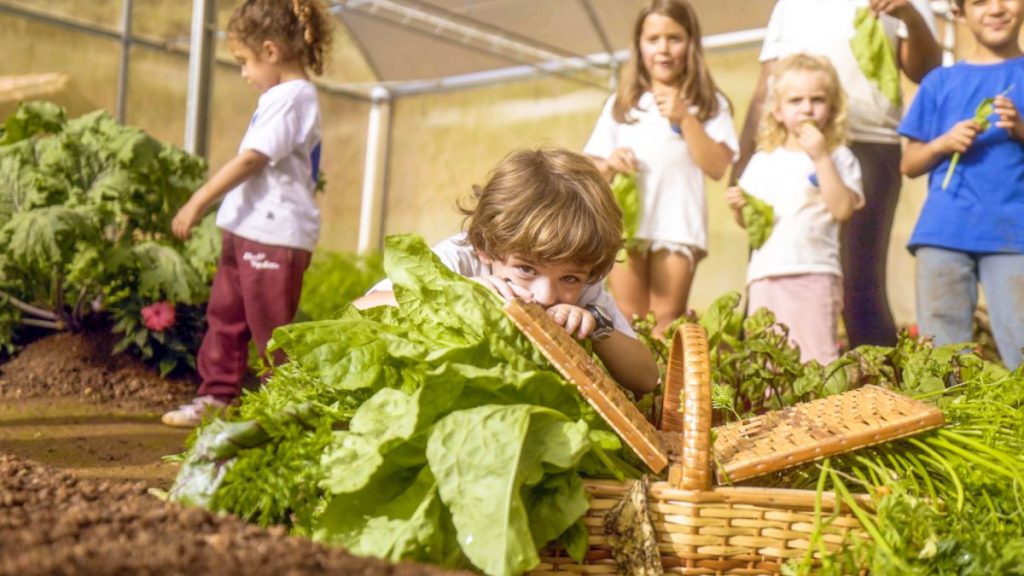
The July vacations are for children and their parents too! From July 17 to 20, Ibiti Village is preparing a special program for children up to 10 years old, in a magical and educational weekend that brings together nature, science, cooking and fun. Ibiti Kids is a light and enchanting immersion, designed so that the little ones can play, learn and connect with the territory in a playful and welcoming way. Book here! More than just fun, Ibiti Kids is about learning environmental education in practice. Each activity has been designed to raise children's awareness of the importance of contact with nature, preserving the planet and environmental regeneration - pillars that guide all of Ibiti's work. Outdoor activities during the vacations In Vila Mogol, children can play freely outdoors, among trees, orchards and flower gardens, discovering the world independently. The ibiti Kids program begins with lunch at the Yucca Restaurant and a warm welcome. Contact us for the full program! During the immersion, the children take part in an exclusive trail for little explorers, visit Gaia's vegetable garden for a garden-to-table experience and venture out on a variety of activities, ending with a lively Pizza Night at the Yucca Restaurant. And there's more! The stay at Ibiti Village includes: - Morning yoga for children - Children's cinema sessions at the Cine Mazzaropi - Visit to the Oca built by the indigenous people of Xingu - Activities on the beach tennis court - Heated swimming pool in the spa - Fitness room - Natural playground for children - Trails and waterfalls on the Mogol Water Circuit - Trip to the Ibiti Orchids Nursery Extra activities The activities are carefully organized, with the option of hiring additional trails and exclusive experiences, such as e-bike rides, horseback riding and the special visit to Muriqui House, where biologists guide the children to meet the group of muriquis that inhabit Ibiti and learn about conservation and rewilding - an unforgettable experience of connection with nature. Stay in a charming village integrated with nature The houses at Ibiti Village have a soul, a name and a history. With a variety of styles - from sophisticated rustic to regenerative contemporary - each accommodation has been designed to welcome, inspire and provide comfort with purpose. Books scattered around each room, large spaces and incredible views of nature, the mountains and waterfalls complete the experience. Among the highlights are: Ibiti: Regeneration, environmental education and unique experiences More than just a winter destination, Ibiti is an invitation to live in harmony with the environment. The project is a benchmark in environmental regeneration, the reintroduction of native species, waste reduction, organic production, solar energy and environmental education. The local community actively participates in the experience - and this is reflected in the genuine hospitality that welcomes each visitor. Book: (32) 98449-2200
Vegan taioba risotto by Mary, chef at Yucca restaurant
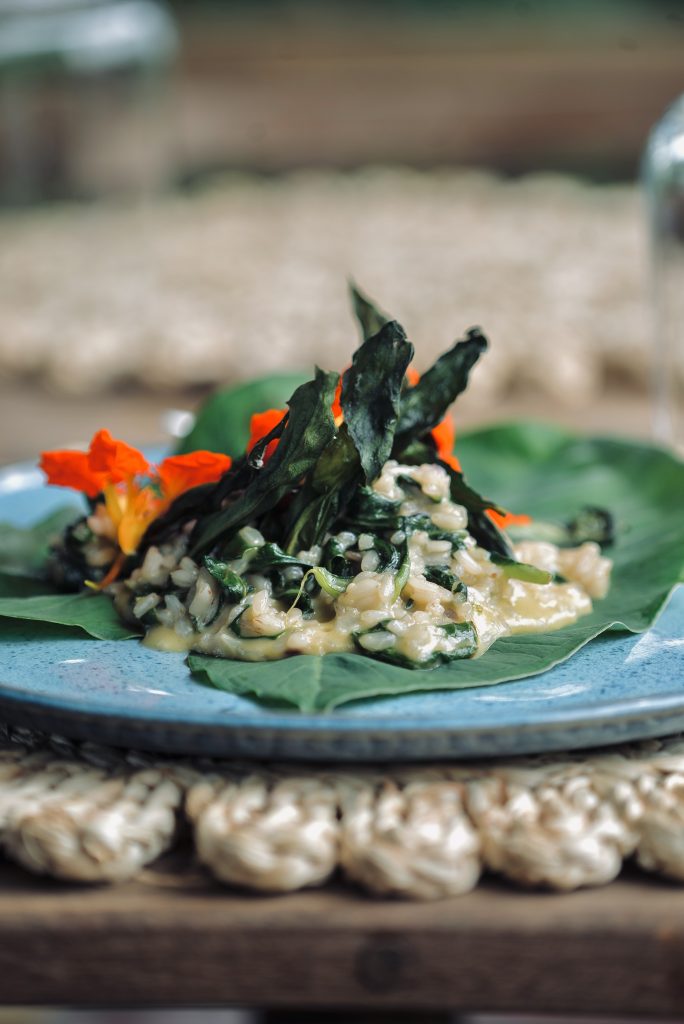
Get to know chef Mary's story and learn the recipe for taioba risotto with crispy ora-pro-nóbis, from the Yucca restaurant at Ibiti Projeto.
Winter in Ibiti: Days of warmth and well-being in nature
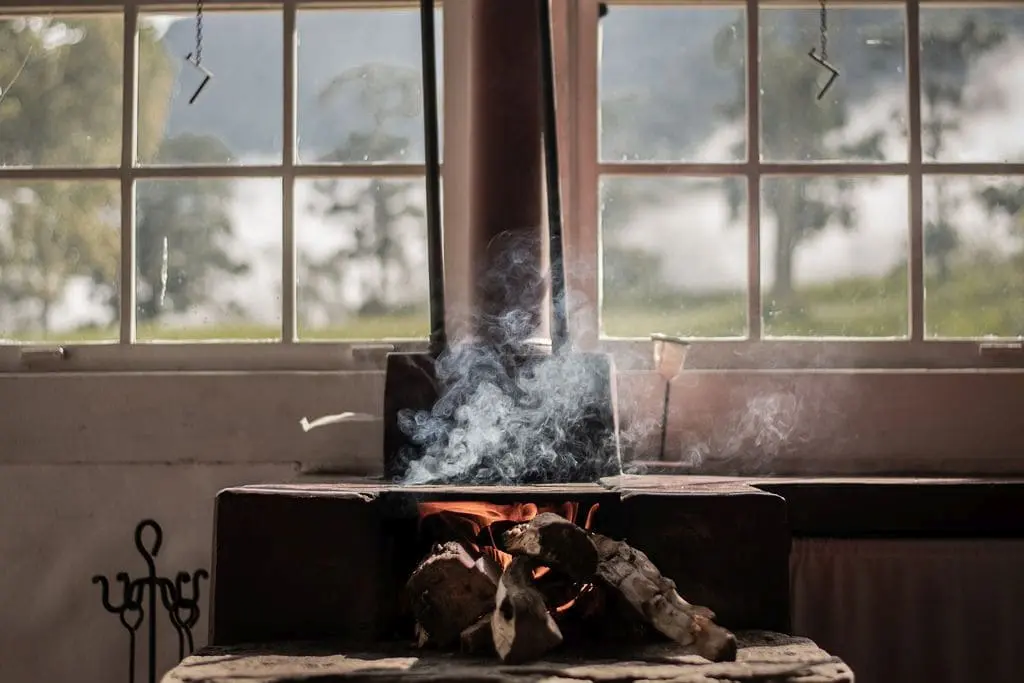
The winter season in Ibiti is packed with cultural, gastronomic and outdoor activities. All this amidst 6,000 hectares of preserved nature. Take advantage of the vacations and holidays in June, July and August and come and enjoy a program for couples, groups and families with children!!! Choose the best date and come! Highlights of the winter 2025 program at Ibiti Village Ibiti Arraiá (June 27-29) Tradition, flavors and joy Ibiti style Ibiti Kids Holidays (July 17-20) July is for the kids (and their parents too!) Accommodation in a charming village integrated with nature The houses at Ibiti Village have a soul, a name and a history. With a variety of styles - from sophisticated rustic to regenerative contemporary - each accommodation has been designed to welcome, inspire and provide comfort with purpose. They all have books scattered around each room, large spaces and incredible views of nature, the mountains and waterfalls. Among the highlights are: Luxury with purpose: regenerating is living better More than just a winter destination, Ibiti is an invitation to live in harmony with the environment. The project is a benchmark in environmental regeneration, waste reduction, organic production, solar energy and environmental education. The local community actively participates in the experience - and this is reflected in the genuine hospitality. In addition, Ibiti Village has: Also visit: Muriqui House Project A guided tour by biologists to get to know the group of muriquis that inhabit Ibiti up close and learn about conservation and rewilding. Big Family Statues See the set of giant sculptures made from recycled metal by artist Karen Cusolito, at the top of Pedra do Tatu. Why choose Ibiti this winter? - Because here you're not just a guest: you're part of a living village that takes care of the planet.- Because the program is authorial, personalized and transformative.- Because you breathe fresh air, learn, reconnect, have fun - and come back different.- Because winter here has soul, it has human warmth, it has purpose. Book now and experience a winter with soul Whether you're celebrating love, playing with your children or just taking a deep breath to rebalance yourself, winter at Ibiti Village is an invitation to (re)connect. Book: (32) 98449-2200 Ibiti.com
Natture Force: a spiritual retreat in Ibiti
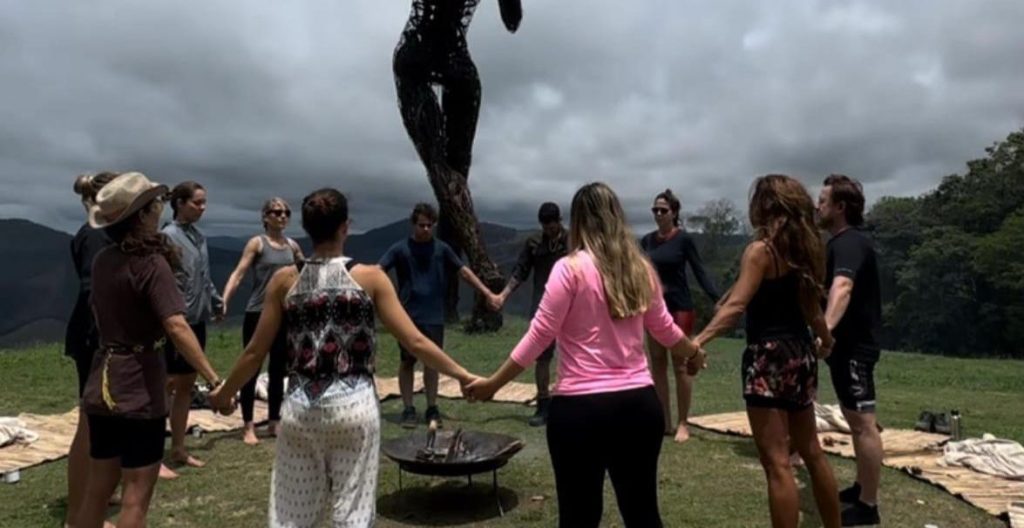
Imagine yourself surrounded by the peace of mountains and waterfalls. Natture Force is a call to those seeking something beyond the routine, a deep dive into nature and their own being. Scheduled for the second semester, the spiritual retreat in Ibiti promises to transform eyes and awaken dormant senses. Book this experience! This sensory journey is taking place for the second time at Ibiti Projeto, with accommodation at Engenho Lodge, marked by silence, privacy and beautiful landscapes. In 2024, the first edition brought together a group who indulged in practices in the midst of nature. Five days to slow down Modern life pushes us to rush, to disconnect. But what if, for five days, we could slow down? That's what Natture Force Ibitipoca proposes: an immersion in experiences that rescue the essential. Walking along trails where each stone seems to hold a story, feeling the touch of the cold water of the waterfalls, choosing the herbs for a special bath with your own hands. Every moment is an invitation to be fully present. The magic of the experiences The Natture Force spiritual retreat doesn't have a rigid itinerary; it has a flow. A rhythm that molds itself to the energies of the group and the place itself. Some experiences await the participants: The people who guide this journey "Our call is simple: to remember who we are. By silencing the mind and listening to nature, we find answers that have always been there. Awakening is not a destination, it's a path." - Graziella Pinto, one of the organizers of Natture Force The altar of Natture Force Natture Force takes place in one of the most impressive territories in Brazil. Ibiti Projeto is an innovative socio-environmental enterprise that integrates sustainability, well-being and regeneration. With one of the best sustainable luxury hotels in the world, it offers an authentic experience of immersion in nature, where body, mind and spirit are harmonized. Information and reservations The program includes accommodation at Engenho Lodge with full board, all the experiences and the rental of the e-bike. In the end, the question that remains is: are you ready to awaken?
Vedanta Ibitipoca Retreat: Self-knowledge and wisdom retreat
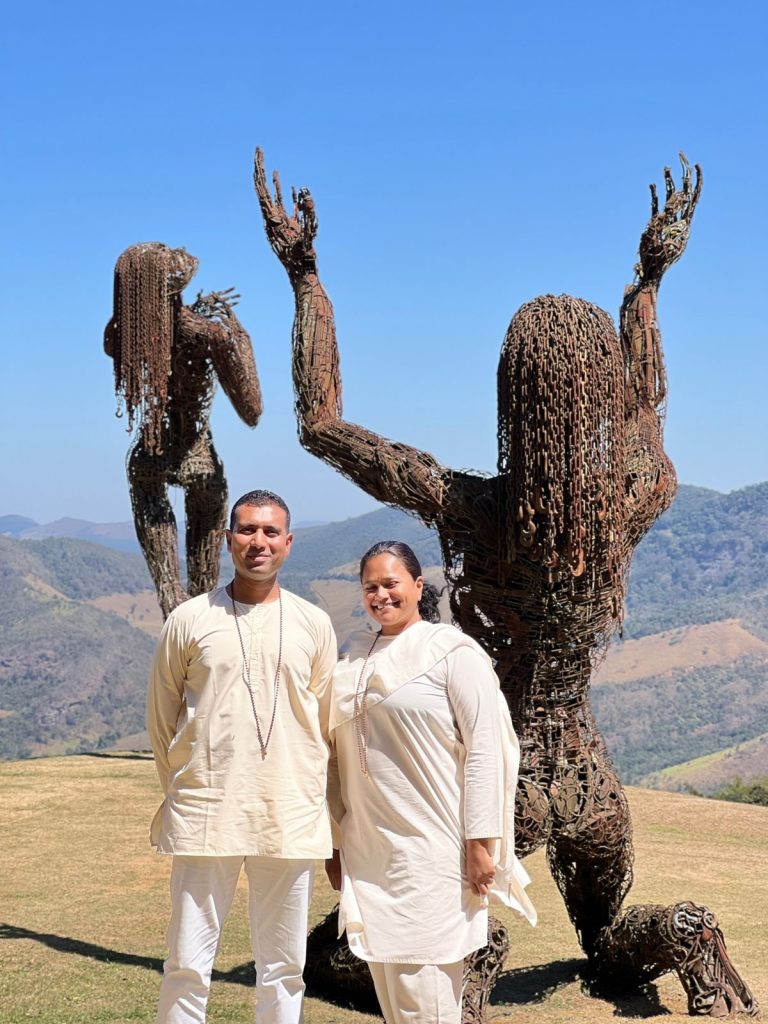
Have you ever stopped to ask yourself what your true purpose in life is? Meet Vedanta Ibitipoca Retreat, the annual Vedanta retreat at Ibiti Projeto. In the midst of the hustle and bustle of everyday life, we rarely have time to reflect on the essential questions of existence. How do we find mental clarity? How to reduce stress and anxiety? How to live with more purpose and balance? From August 27 to 31, 2025, amidst the serenity of the village of Mogol, the Vedanta Ibitipoca Retreat invites you to dive into these questions, reconnect with yourself and find answers in the ancient wisdom of India. Under the guidance of the experienced Sudhakar and Avania, from the Vedanta Academy in India, this immersion combines philosophy and self-knowledge. The program, all in English, includes inspiring classes based on the Bhagavad Gita, nature walks, yoga sessions and healthy meals, creating an ideal environment for reflection and transformation. "It's an invitation to slow down and go deeper into self-knowledge, based on ancient teachings. The expectation is to bring together a cohesive group, interested in the philosophy and seeking personal development, as happened last year" Dario Galvão, organizer of the event, which takes place in attractive locations in Ibiti Projeto Vedanta: The Ways of the Wise Vedanta is a philosophy of life that originated in India. It guides you towards a clearer vision of your personality and your purpose in the world. The retreat highlights the importance of prioritizing mental and intellectual health. Learn principles and practices to reduce everyday stress and anxiety. Delve into passages from the Bhagavad Gita and discover the true purpose of life. What is the Bhagavad Gita Written in Sanskrit, the Hindu work is the essence of India's Vedic and sacred knowledge and one of the world's greatest classics of perennial philosophy and spirituality. What to expect at the Vedanta Ibitipoca Retreat? Over the course of four immersive days, you will experience a combination of deep learning and moments of connection with nature. Mornings are dedicated to studies, hikes to the waterfalls and yoga practices that prepare the body and mind to absorb the knowledge. During the day, lectures cover essential topics such as Mind Management, The Middle Path, The Three Yogas, among others, always followed by enriching group discussions and question and answer sessions. In addition to intellectual learning, the retreat also offers the opportunity to experience practices that help reduce everyday stress and anxiety. By following the principles of Vedanta, you will discover how to integrate practical wisdom into your daily life, bringing more balance and clarity to your life. "We all need moments like this to renew our energies and see situations in different ways. We acquire more serenity and peace to make important decisions in life," says Christiano Freire, who took part in the first edition of Vedanta Ibiti. Connection with nature and healthy food At Ibiti Projeto, the experience is not limited to philosophical teachings. You can also enjoy delicious vegetarian and vegan meals, prepared with fresh, local ingredients. Healthy eating is an integral part of the retreat's philosophy, which values the holistic well-being of body and mind. Sudhakar and Avania's wisdom Sudhakar and Avania have more than 20 years' experience studying under the renowned philosopher Swami A. Parthasarathy. They have traveled to more than 15 countries, bringing the teachings of Vedanta to universities, companies and organizations around the world. With an approach that is both accessible and profound, Sudhakar and Avania are masters at making complex philosophical concepts easily applicable to modern life. Schedule - August 27 to 31, 2025 - Vedanta Ibitipoca Retreat - The entire event takes place in English Wednesday, August 27 4pm - Arrival 5:45pm - Classical Living 7pm - Dinner Thursday to Saturday, August 28 to 30 6am - Individual study7:15am - Yoga8am - Breakfast9:15am - Lectures: 10:30 a.m. - Hike to the waterfalls / Visit to the statues12 p.m. - Group session13:15 p.m. - Lunch14:15 p.m. - Rest16 p.m. - Q&A session17 p.m. - Tea17:45 p.m. - Lectures: 7 p.m. - Dinner Sunday, August 31 6 a.m. - Individual study7:15 a.m. - Yoga8 a.m. - Breakfast9 a.m. - Departure Transformation and renewal At the end of the retreat, you'll leave with practical tools for dealing with the challenges of everyday life, a greater understanding of your purpose and a new perspective on what it means to live wisely. It's an opportunity to slow down, reflect and take a new direction in your personal journey. Registration and practical information If you have any questions, please contact avania@vedantin.online Get to know Ibiti Village Book your place now and embark on this experience of transformation and self-knowledge in the heart of Ibiti Projeto! Reservations Center (32) 98449-2200
Cine Mazzaropi: The Magic of Cinema in Ibiti Village
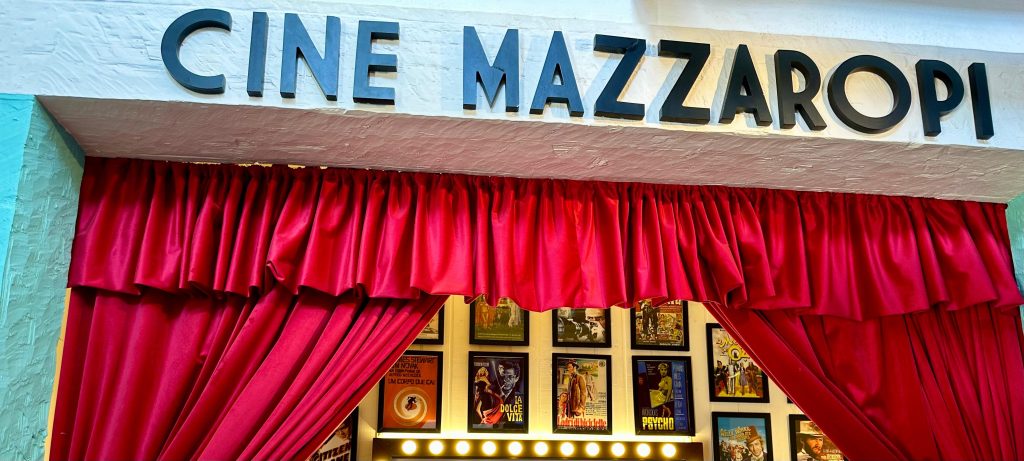
Check out 3 movie tips to watch at Cine Mazzaropi, a cultural space that recaptures the nostalgia of street cinemas
Ibiti Harvest: An immersion in sustainable gastronomy
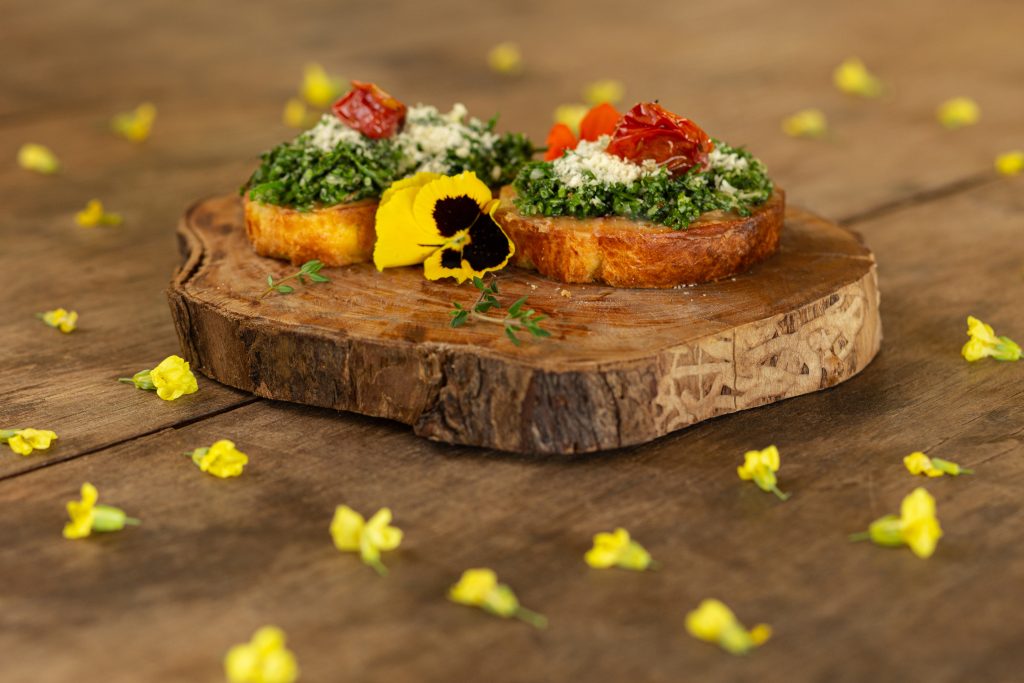
Experience Colheita do Ibiti, a sustainable gastronomic event from March 27 to 30 at Ibiti Projeto. Renowned chefs create plant-based dishes with fresh, local ingredients. Limited places available!
Local organic products: 5 reasons to eat them
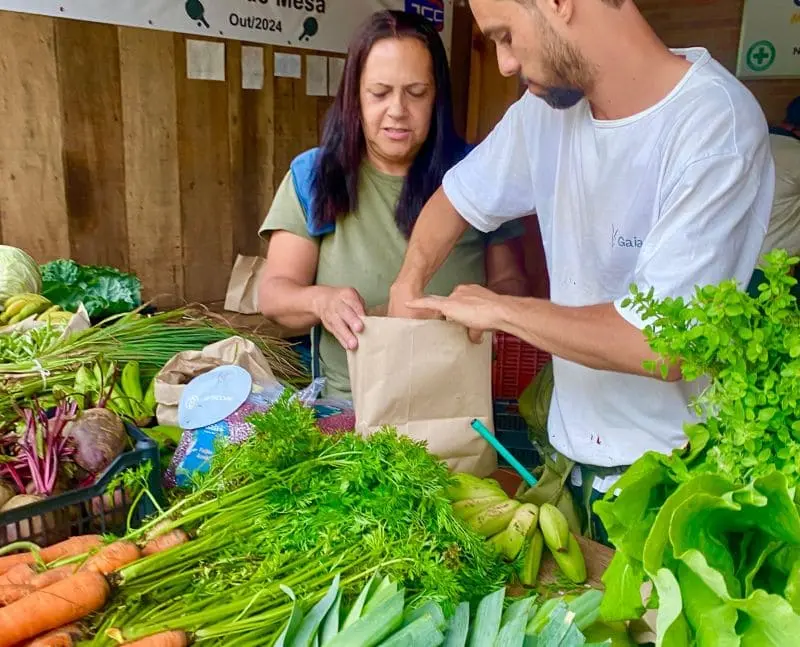
Gaia Fair connects the community with organic, fresh and healthy products, from leaves to peanuts and even asparagus
Ibiti 42 years magazine
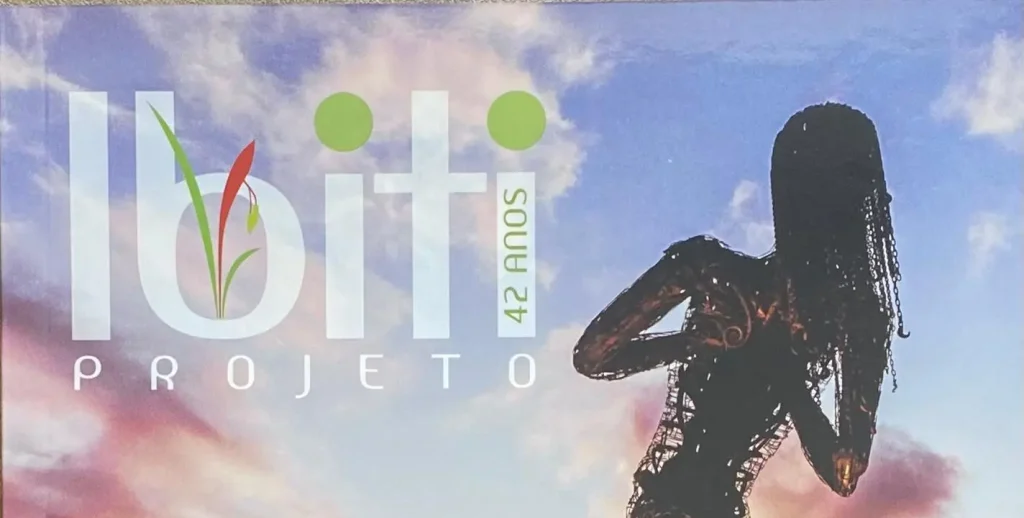
Read the commemorative edition of Ibiti 42 years magazine, launched in 2024 The second edition of Ibiti 42 years magazine, from 2024, presents our actions, projects and values the people who wrote (and write) this story. It brings up the themes of socio-environmental education, the importance of community, good relations with neighbors and, above all, the desire to celebrate life! Tasty reports, full of beautiful images, show that we value the local culture of Minas Gerais and that we are open to dialog and new ideas. With topics linked to veganism, sustainability and re-farming, Ibiti 42 years reinforces our commitment to regenerating the planet. This is another work by Raquel Ribeiro (texts and editing) and Jean Pierre Verdaguer (graphic design). Available in Portuguese and English. Portuguese version: Download the PDF and enjoy reading! English version: Download the PDF and enjoy! Reservations Center: (32) 98449-2200